#it’s interesting that this story uses the ‘women’s intuition’ trope
Explore tagged Tumblr posts
Text









Captain Marvel Adventures (1941) #19, published in December 1942
#it’s interesting that this story uses the ‘women’s intuition’ trope#but still has Mary ‘charge in like a blundering bull’ and need to be taught to do ‘a little quiet snooping around’ first to catch criminals#what I’ve seen of ‘women’s intuition’ being used in The Avengers (1963)#has been limited to having a female character contribute in the catching criminals part#while then leaving the fighting primarily to the male characters#also Captain Marvel Jr. did not get a training story before he went off in his own solo stories#I assume the difference is not because it was thought surely that’s necessary for a female superhero#but to have Mary appear in another Captain Marvel story to promote her to readers more before she went off to be in her own stories#fawcett comics#mary batson#billy batson#my posts#comic panels
20 notes
·
View notes
Note
What do you think of the trio's post-canon careers? Because recently, something that has really captured my imagination has been the idea of healer Ron.
The profession, of course, most often crops up in Dramione fic where Hermione has taken up at St. Mungo's (laughable-- this is a girl who needed Harry to unstopper the dittany because her hands were shaking so bad, and frankly, I shudder to think of her bedside manner) but it is predictably absent when veering off the canon course with Ron. This is such a shame because his willow wand is outright good for healing magic (and it is a fairly uncommon combination that he has! The only other person with a willow and unicorn wand, fascinatingly enough, is Lily Potter.)
Ron is also the only person who's canonically interested in healing as a profession (he's immersed in the leaflet for it at breakfast.) He remembers the spattergroit incident from OOTP and then uses it as a cover story in DH. In Half-blood Prince, he takes the exact same classes Harry does, which means he has the grades required to go into auror training, yes, but they are coincidentally the same requirements a student needs to meet in order to apply to be a healer. (On that note: Ron and Harry were clearly high academic achievers and the fanon assertion otherwise needs to be beat back with hammers.)
But the reason why I think healer ron would've been a cracker of a route to go down is just how refreshing it would've been. The Girl of the team, the gang, the trio, being the Healer and Caretaker is such a TRITE trope at this point. DADA Professor Harry is a classic, but this is my case for Healer Ron deserving to be up there. Send his ass back to Hogwarts again if you have to (Hermione will definitely be pleased). Have him intern with Madam Pomfrey for a year and then grumble behind Neville while he takes notes on medicinal herbs. Healer Weasley, who's a big hit in the paediatrics ward because he makes the kids laugh. Who flirts with the oldies and plays chess with the curmudgeons. Who just cares, more than anything, and will bring you a cup of tea no matter the hour, no questions asked. I really do think he's got the disposition for it. What do you reckon?
thank you very much for the ask, anon!
i am immediately compelled by the concept of ron-versus-wizarding-medicine. i certainly never see him as someone who stays in the auror office long-term - i think it makes sense as a career for him immediately post-war, especially when he will undoubtedly just want to keep busy and hunt down baddies as a reaction to fred's death, but i think he only stays in the role after this initial burst of vengeance until he feels comfortable leaving harry in a high-risk situation on his own.
because, of course, ron's vibe with everything he touches in canon is influenced by the fact that he's someone predisposed to being caring [right down, as you say, to his wand]. the bit in prisoner of azkaban when he offers to make a cup of tea while hagrid's in hysterics about buckbeak's death sentence is something i find genuinely lovely, for example, and i do think - as you note - that there's something really striking about ron occupying that caring role within the trio which a fanon deviation to trite gender dynamics in which men are stupid and women are nurturing undermines in a supremely tedious way.
i'm not sure, though, that i would back ron in any specialism of healing that could be classed as emergency medicine - he has the vibe of, and i mean this with great affection, the sort of surgeon who habitually leaves sponges behind in patients...
but i would back him in specialisms which need to be a bit more holistic or slower in pace. his chess skills - and his good intuition - suggest to me that he'd be a pretty effective diagnostician, and he'd have a great bedside manner.
healer ron, then, is going to be at his best, absolutely, in something like paediatrics, which means that i'm going to take your suggestion about him interning with madam pomfrey and run with it to say that ron as hogwarts matron [or whatever the non-gendered version of that term would be] is his ideal career.
think about it! the work's varied and sometimes complicated, but it's not too high-pressure because really serious cases will be sent to st mungo's. the work will frequently relate to things that ron is interested in, like quidditch. and the work will frequently require ron's key talent - being sound - to shine.
this is a man who would do an excellent job, i think, of handling mishaps caused by teenagers trying to hex their own acne off, or offering tea and sympathy to the homesick or the recently dumped. i think he'd do a great sex-ed presentation, would manage to charm honeydukes into giving the school its medicinal chocolate at a huge discount, and would be considered a huge legend by the student body for always being willing to certify to the teachers that someone who used a puking pastille to get out of class was actually sick.
as for the other two, i much prefer hermione as a barrister than as a civil-servant - not just because of her temperament but because i think the change she wants to bring to wizarding society is going to be won primarily by her slapping on a wig and gown and being condescending to witnesses.
as for harry, i like to stick to him as an auror. while i have some exceptions, i'm actually really not fond at all of professor potter as a trope - and, even more controversially, i really don't like the concept of professor riddle - largely because teaching is far too sedate for someone who runs on adrenaline as much as harry does.
and - i must be honest - i think the idea of harry as a teacher [or a healer or a quidditch player] often hangs on people feeling uncomfortable with the idea of him as, to all intents and purposes, a police officer. but i quite like taking that in the opposite direction, and playing with harry's canonically black-and-white morality and capacity for self-righteousness to have him becoming - while not a corrupt or sadistic auror - a complacent one.
i like the idea of him as someone who thinks [correctly or not] that he always applies the law justly [and so the law is therefore just] and so on.
aka, the position he essentially takes to his own childhood lawbreaking...
#asks answered#asenora meta#golden trio#ron weasley#harry potter#hermione granger#ron would be beloved by all nurses and that tells you all you need to know
176 notes
·
View notes
Text
One thing I'm so relieved with in Alan Wake 2 is the handling of female characters - especially Alice. The women of Alan Wake 1 were fairly lackluster: we have Barbara Jagger, a concept of a girlfriend more than a character, Rose, a pretty one-note fangirl who also just gets taken over by the Dark Presence for most of it, Cynthia Weaver - by far the best of all of them and one of my favorites, and then Alice.
Alice is so bland in Alan Wake 1. She's the classic hero's tragic wife who gets taken/killed early on to prompt him to save her. We get very little of Alice outside of her relationship to Alan. She's a plot device more than a character.
But I found myself so much more invested in her in Alan Wake 2. We get to see her photography - something that had mostly been introduced as a way she creates covers for Alan's books in the first game and now gets to stand alone as something purely from Alice. We get to see her process her fears and her traumatic experience through her art. We see her using her art to fight back against the thing haunting her. We see her as an artist in her own right and not just the wife of one.
I love the decision to only ever show Alice in videos - she feels real that way, and the choice to have her staring at the camera telling the viewer directly what she's going through and how she feels really worked to actually connect me to her. She finally felt like more of a person than just a concept.
And on top of that, we got so many other fantastic women.
Rose got more personality and agency - still a fangirl through and through but there's more to her than that now. She's hilarious and weird and runs around fighting shadow monsters because she thinks a dead author speaks to her through the clouds - and she's GOOD at it, actually. She knows what she's doing and how to protect herself and does what she can to help Saga along the way.
Saga is fantastic. She's capable and determined and good at her job, but also weird. She's excited to get a cult case. She finds a weird doll in the woods in some kind of ritual set-up and thinks it would make a good gift for her daughter. She's been psychic probably her whole life and just wrote it off as intuition. She's tormented with doubts and insecurities but the people in her life reassure her that's she's doing her best and has done so much for them.
Kiran is the tough government agent trope but as a woman, and I mean that in a good way. She gets to be a strong leader, kind of mean and annoying to deal with at first, stubborn, and capable. She has the bitter ex-wife who couldn't deal with her work. She bonds with Casey over marriage problems and drinking. She gets to shine in The Lake House, and I love it. Her role in the story would have been so easy to write as a man and they didn't go that route.
Remedy Games overall do still tend to have more men than women, but it feels like they're making a genuine effort to include more diverse, interesting women with every new installment, giving us more options to play as them, and I really appreciate it.
#also like diana marmont in the lake house? fantastic evil terrible woman with like no redeemable qualities#three of the four expansions were led by women and that's fantastic#two of those by women of color#I haven't played max payne but it definitely feels like they're improving from the classic masculine hero route of storytelling from#max payne and alan wake 1#alan wake 2#remedy entertainment
20 notes
·
View notes
Text
MDSZ Name Meaning Explanations
Wow MDSZ has intricate naming: there are a lot of interesting meanings that fit very well with the characters!
One thing I realized when I researched names is that Chinese names, like Japanese names, are filled with a lot of nuances that have to do with the characters themselves and their role in the story. The character’s names subtly explain their roles and personality in the story.
These are the characters I noticed are the ones that don’t have a lot of posts about their names. I decided I am going to do a post on the characters whose name meanings are not much talked about in the fandom.
This post is heavily inspired by thisworldgodonlyknows who made a post explaining the meaning of the names from one of MXTX works and what it has to do with corresponding with the characters.
MXTX’s names for her characters in her works seem to be chosen intuitively. This makes sense because the names she chooses have a lot to do with both the characters and their arc in the story.
I won’t be doing any explanations on Wei Wuxian, Lan Wangji, Jiang Cheng, and Jiang Yanli
because they already had more than enough metas on them. I’m not a Chinese speaker, so although I will explain my research to the best of my ability in this post, take it with a grain of salt.
Mo Xuanyu (莫玄羽)
Mo Xuanyu’s entire name is a subtle reference to his background in the story.
His surname Mò/莫 means "do not, is not, can not" or "there is none who -“
The character in his surname is used to refer to saying something that is puzzling, baffling or impossible to explain in the Chinese language.
This would make sense when talking about Mo Xuanyu since all we know about him is that he's one of Jin Guangshan’s many illegitimate children. Once a disciple of the Jin Clan until his expulsion due to his homosexuality and harassment of the Jin sect leader Jin Guangyao, his expulsion resulted in more abuse at the hands of his family. The abuse he suffered caused his mind to mentally deteriorate, producing a vengeful side of his personality which led him to take up demonic cultivation leading him to perform the body offering ritual to bring Wei Wuxian back to get revenge on his family for the abuse he suffered from.
We don’t know an awful lot about him or his personality other than his background so this makes him come off as very mysterious.
The character in his given name is Xuán/玄 means "black/mysterious”
The character Xuán/玄 is another character to refer to the color black in a specific context in Chinese but when this character is used it also has negative connotations. The symbolism that black is associated within Chinese culture is destruction, evil, disasters, sadness, and suffering; it is considered an unfortunate color. The symbolism for the color black goes very well with Xuanyu as a Character in his role. The bad fortune aspect could reference how he was expelled from the Jin sect, his suffering under the abuse of the Mo family, and wishing for revenge on them for the abuse he suffered under wishing destruction on them. Black the color of evil this can refer to his interest in demonic cultivation and his connection to Wei Wuxian who practiced demonic cultivation donned black clothes and was called evil by the cultivation world.
Black is another way to refer to yin because yin has the color black. Wei Wuxian’s birth name Wei Ying comes from yin as in yin and yang the character Ying (嬰) from Wei Wuxian birth name comes from Ying ling or infant spirit in Chinese used to refer to the spirits of dead fetuses Which is a possible nod to his demonic cultivation. Ying means infant it can also come from yin as in ghost, death, and evil a subtle reference to he brings Wei Wuxian back through the body offering ritual.
The second character in his given name yǔ/羽 means “feather" (羽) is the character is used for “immortal" or "ascending" this can be considered to be an irony to him similar to how someone who didn’t ascend in cultivation is equivalent to someone who cannot fly. Mo Xuanyu is someone who didn’t ascend in cultivation hence his weak cultivation. (羽) when the language is used in a negative connection meaning “ascend" or "passed away” in Chinese this is given insight into how he died mysteriously with the body offering ritual. His entire given name can refer to how he vanished without a trace, mysteriously and without a sound, like a feather.
Qin Su (秦愫)
Her surname doesn’t mean anything in Chinese; it is just a surname Her given name Sù/愫 means “guileless and sincere” in Chinese this can refer to what was described in the novel as appearance and personality-wise someone innocent and naive.
If you look closely her entire name is a homophone to Qingsu (情愫 qíng sù sentiment feeling) a phrase that is used to describe feelings in Chinese.
Qin Su is an emotional character, guided by her own emotions. This makes her different from other characters who are corrupt and squash their sentimentality for ambition or revenge since the emotional aspect makes her name sound like a sentiment feeling.
Qin Su is guided by her emotions which give her strength An example of this is noted in her backstory. Is when JGY saved her during the sunshot campaign gave her the will to pursue him. The most prominent scene of an emotional outburst where she openly lambasts her husband/brother for his deception and murder of her son her feelings of rage and betrayal gave her the strength to actively resist JGY as he attempts to coax her into giving out the name of who gave her the letter.
An innocent emotional character compared to the corrupt cultivators who died horribly who was too innocent to survive in the corrupt world of cultivators and could not handle knowing the dark truths.
Yu Ziyuan (虞紫鸢)
The character in her surname Yú/虞 means "be anxious or worry." If you dive deeper into her character it speaks to one of her major concerns to how her husband perceives herself and their son in comparison to Wei Ying. Her surname references her major insecurities.
Zǐ/紫 means “purple" her signature color and yuān/鸢 means "kite (bird)” the kite is a type of bird of prey this speaks to her aggressive and fierce personality and strong cultivation.
Zǐyuān (紫鸢) is also another way to refer to the Chinese wall iris; purple is the color of the iris, so this again references to her signature color. Iris has noble connotations that speak to her noble status and a fact that she is a graceful and elegant woman even with her bad temper. Purple flowers are tied to royalty represent dignity and pride both speak to her tremendous pride and noble status.
Luo Qingyang (罗青羊)
Next is Mian Mian
Luō/罗 means “silk” in Chinese; this can invoke the trope "silk hiding under steel.” Underneath her delicate appearance is a tough backbone; she is not afraid to stand up to her own beliefs and the people she cares for.
The character in her given name Qīng/青 means “green" but when used in classical Chinese Qīng is another way to refer to “black”.
yáng/羊 means “sheep.” Sheep are considered innocent in Chinese; the sheep symbolism could emphasize her initial appearance as a frail damsel in distress who needs to be saved. A woman who is considered weak and dumb as a sheep by the sexist men of society.
Also, in ancient Chinese symbolism, sheep represent justice, which goes hand in hand with her tough backbone who is not afraid to stand up to her own beliefs for what’s right and wrong.
So, her given name together means “black sheep.” She would be considered the black sheep in the world of cultivator being born a servant and a woman and easily dismissed.
The black sheep part can refer to how someone who chooses to outcast herself from mainstream cultivation society in favor of pouring her own life as a rough cultivator on its outskirts with her family.
Her nickname MianMian comes from Chinese sheep wool which is called mian yang (绵羊).
Jin Rusong (金如松)
The character of his first name Rú/如 has the same character and meaning as Jin Ling birth name Rúlán/如兰
This refers to how he is the same generation as Jin Ling.
The second character sōng/松 means "pine tree.”
If you put the characters of his given name together means "to be like a pine tree” this Sounds like the phrase "to make like a tree and leave” This can note his one-time appearance in the story. Pine trees symbolize longevity and long life; this is ironic for him because his fate of dying young.
Jinzhu and Yinzhu (金珠 &. 银珠)
Another two minorish characters are Jīnzhū/金珠 and Yínzhū/银珠 their names mean “silver pearl and gold pearl” this doesn't mean much on the surface since the meaning of their names is obvious.
In Chinese pearls, gold and silver are connected to wealth, money, and status. They are meant to say something about Madam Yu’s status as a noble and to emphasize their relationship between master and servant.Gold and silver are valuable and prized this empathizes them being Madam Yu’s prized servants, but this can also indicate something about them as people: they are both known for being extremely skilled cultivators. Their fancy names highlight how prized they are personally to Madam Yu as her right/left-hand women.
Jin Zixuan (金子轩)
Zi/子 means (child), Zi/子 is a generational character that is used in the Jin clan by Guangshan to name his children this can Zixuan is the only legitimate child of the sect leader of his father.
The second character xuān/轩 means "a tall pavilion.” The character xuān/轩 is used to mean “dignified as a king.” His entire name can refer to his position as the inheritor of the Jin clan with all their wealth and estate prestige as well as his lofty attitude.
Jin Ling (金凌)
There was already a meta on Jin Ling birth name Jin Rulan,
His courtesy name Líng/凌 means "rise above.” The e name it goes with the statement "I’ll rise above others;” he wants people to think differently about him due to their prejudice for having no parents and rise above the people’s perceptions of him.
This can mean his character development that he’ll rise above the adults of society and escape the prejudice they eat up through his growing acceptance of Wei Wuxian and maturity at the end when he takes over as a sect leader.
Wen Ning (温 宁)
Wen Ning’s given name Níng/宁 means “peace"
His name notes his kind nature in contrast to his cruel, power-hungry relatives and his peaceful nature even when turned into fierce corpses.
His courtesy name Qiónglín/琼林 means “beautiful forest;” this notes his timid personality who hides behind others who is seen hiding behind his sister when first introduced and his low confidence in himself. Forests are used to hide outlaws. This can refer to how he had to hide from society since it deemed him dangerous since he was restructured by Wei Wuxian.
Wen Qing (温情)
Wen Qing’s entire name (Wēn Qíng,温情) when put together means “tenderness” it shares the same character(情) as Qin Su’s name.
She does have a kind-sounding name. At first glance she seems harsh and aggressive but she’s shown to be very kind as shown by her willingness to continuously save WWX and her care for her relatives especially Wen Yuan, and her tenderness and love feelings for her younger brother.
She is also the one who tells WWX “thank you” and “I’m sorry” important arc words that exemplify humility and empathy which WWX then passes onto Jin Ling.
Lan Qiren (蓝启仁)
I found Lan Qiren’s name ironic because the character in his name rén /仁 means “benevolence,” the same one used for kindness and humanity.
I find this ironic in the way he treats his nephews prizing them on the surface as gentlemen but not as individual people.
I find the Qǐ/启 “open" part ironic as well because he doesn’t hold an open mind with Wei Wuxian’s antics considering him a “corrupting influence” on his nephew and disapproved of his use of demonic cultivation. Reluctance to accept him and Lan Wangji’s marriage, scolding Lan Xichen for showing grief over his best friend’s death despite his feelings and life in danger. On the surface, it doesn’t seem like he actually holds any kindness but when examined the character rén /仁 it fits his personality well.
The character rén /仁 came from Confucianism. Ren is the fundamental virtue in Confucian that represents the moral qualities that govern man and his relationship with others. It’s considered the perfect virtue or can be categorized as the ren of virtue and ren of affection. Ren of affection is considered compassion and empathy for others as well as altruism for another human being. Ren of virtue symbolizes the perfect virtue of moral perfection and human excellence, to become a morally perfect individual to nurture morally upright individuals that are grounded in moral values.
When I looked deeper into rén /仁 it says a lot about him as a character which is that he cares about the rules of the Lan sect and gets angry at any perceived misconduct. Though he lacks the kindness and humility of ren he has the rules of ren Qiren have more of the ren or virtue is seen how he treats his nephews characterized them as perfect moral gentlemen first than people the second build on his high standards to his nephews, to be honest, righteous and immaculate raise them to be model students.
This can reference his status as a teacher in how he teaches both his nephew and students to be upright and moral citizens of society. the meaning in his given name "Open benevolence” can be on how he preaches the rules to others in short openly preaches the ren in Confucianism the character rén /仁 suits someone who cares about the rules not the compassion of ren.
Lan Jingyi (蓝景仪)
Jǐng/景 means “scenery"
Jingyi’s second character yí/仪 contains the meaning "courtesy, etiquette, manners" and comes from Yi which is something that is used in etiquette and ceremonial.
His name can be a reference to him being in the Lan sect and his and Qiren’s names are made to represent the Lan sect principles.
When you look at Lan Jingyi he doesn’t seem to fit the traditional standards of a Lan sect disciple with being both brash and outspoken, but he is the Laniest of the Lan sect disciples there is. He does care about the Lan sect rules and gets angry at anyone who breaks them this is shown with the way he gets annoyed at Wei Wuxian in Cloud Recess for breaking the rules and how he embodies the Lan sect motto is when he speaks up for Wei Wuxian against the cultivators during the second segue of the burial mounds. He shows to be different in the way he follows the rules and discipline, not in a quiet, stiff way but a very loud outspoken way.
Jin Guangyao (金光瑶)
His name is a cruel irony to his character and symbolic of his relationship with him and his father.
His birth name is Meng Yao. Meng/孟 means " eldest amongst brothers” this can mean being the only son of his mother. Yáo/瑶 means "jade, precious stone” this can infer how he is beloved by his mother.
But his name Yáo can likely be a reference to the pearl button Jin Guangshan gave Meng Shi. The pearl button is symbolic of his relationship to Meng Shi and Guangyao.
Another is seen in his courtesy name Guangyao is that he lacked the generational name Zi like the rest of his father’s children. There’s a reason for that.Him not sharing the generational character means that Jin Guangyao is acknowledged as part of the family but not as a son. This showed that Guangshan accepted him due to his accomplishment only to further his ambitions for the Jin clan and insulted him by saying he was not in the same status as his sons denying him from an equal standing among them. He was never acknowledged as having equal standing with them because of his status as the prostitute’s son.
His courtesy name Guang/光 carries the same characters in Guangshan’s name this can apply his desperation to get his fathers love and approval to how he does anything to gain it.
Only to realize that he never thought much of him and was like the prostitutes in the brothel he uses then discards when he’s done with them just like how his father did with his mother. he doesn’t actually think much of Guangyao and Meng Shi only being valued Meng Shi for giving him personal amusement and pleasure but not value as a person and GuangYao for his accomplishments for his political goals, not the person himself he’s someone of little value to his father as the pearl button had.
Nie Mingjue (聂明玦)
Second, of the Venerated Triad Nie Mingjue. If you split the name character apart Míng/明 means “clear, bright” and jué玦 means "a penannular jade.” His name is read as "bright penannular jade"
Jué玦 comes from Yujue/ 玉玦 which is a jade pendant that is often used as a symbol of separation or resolution for homophony reasons reference as someone who has their mind made up and won’t change it; this notes his relationship with Guangyao and NMJ’s personality. The separation and resolution note his tragic broken bond with Jin Guang Yao whose rigid view of morality and sense of justice and Guangyao’s desperation for approval worsened their relationship over time.
His name goes well with his rigid views of justice and black and white mortality he displays. He is someone who never listens to the views and opinions of others and never empathizes with them; he is someone who is deadset and rigid in their views who won’t listen to someone’s opinions regarding his own rigid black and white morality and harsh pursuit of justice.
Lan Xichen(蓝曦臣)
Lan Xichen name xīchén/曦臣 means “Chancellor of the morning sun”, the chen/臣 part of his given name notes his warm, friendly temperament in contrast to his younger brothers frosty cold exterior the morning sun next to his brother’s stoic face. Chancellor refers to his high position in the cultivation society of the venerate triad members of the Lan clan.
His birth name huàn/ 涣 means to “dissolve” which could mean the dissolution of his innocence as he grows more aware of the corruption that lies around him even those he trusts the most at the end of the story he’s left in turmoil he has to deal with the fact that he factored into the deaths of his two friends. His doubts towards Nie Hanshang could imply that he would go back to the optimistic naive man he once was.
Nie Huaisang (聂怀桑)
Last but not least the character whose meaning I am going to talk about is Nie Huaishang His entire name Huáisāng/怀桑 means “to hold mulberry leaves”.
In China, mulberry trees are planted because they are a staple food of silkworms to make silk
growing mulberries suggest wealth and security. This meaning suits Huaisang perfectly. He's someone who enjoys simple luxuries like keeping fans and hates to work hard love to live a comfortable life.
But there another aspect of his personality that of being a chess master who watches his plans go into fruition all the while watching comfortably at the side he manipulates and plans the events that take place in the story his process is like he’s spinning silk from behind the scenes. someone who sits comfortably in the background but spins the silk to manipulate the events in place.
This is only my interpretation of what the name means for the characters if you feel that this isn’t the case feel free to add or change. I am not an expert Chinese speaker so I apologize if I translated something wrong. I want to give a huge shout out to thisworldgodonlyknows who helped me create this post a huge thank you for helping me elaborate on the character’s names.
#mdzs#mo doa zu shi#mo xuanyu#nie huaisang#nie mingjue#jin guangyao#yu ziyuan#yinzhu#jinzhu#lan qiren#lan jingyi#wen qing#wen ning#jin ling#jin zixuan#luo qingyang#qin su#names#name#Name meanings#name meaning
212 notes
·
View notes
Text
I Like to Watch | Barbarian (2022)
by Don Hall
Both Tarantino and Scorsese have bemoaned the lack of imagination throttling film these days. Their argument is that Hollywood behemoths like Marvel and the proliferation of tentpole green screen filmmaking, with the amount of money at stake even to get a project green lit, the risk taking required for innovation is squashed. I hear that and, despite my love for all things super-powered beings on screen, I'd further argue that a solid portion of the blame falls on the amazing democratization of filmmaking via streaming.
In the rush for more to watch (hastened by the pandemic), movies have become content and content requires less in terms of innovation and more in terms of, well, more. The result is a parade of half-baked star vehicles that look phenomenal but ask someone to tell you what it was they saw the night before on Netflix and most can't recount the story just the star power. What was the plot of The Grey Man? Or Red Notice? Or any of the Chris's movies about Navy Seals and CIA agents combatting a corrupt system? A benefit of more money shoved into streaming is that we get more film and television created and directed by and featuring Black, Asian, and Latino talent but with more comes the inevitable leveling stick that increased projects from these communities automatically equals more crap, too.
For every One Night in Miami, there's a Till, the first a highly imaginative take on historical fiction, the other a soap opera of long portrait shots of grief surrounded by a story we already knew. For every Parasite we are forced to sit through some other Netflix show from Korea that is mostly an ape of other, better shows but are seriously difficult to distinguish from four others pumped out of the content machine.
The one genre that finds some purchase in the territory of risk (because it simply costs less to make) is horror. Since before the 1980's, horror filmmakers have worked with less resource to create more memories than nearly any other. John Carpenter revolutionized things by cranking out genuinely scary, incredibly successful horror movies, on a shoestring budget. Plainly, horror is the genre where risk is rewarded time and time again.
I'd heard the rumblings about Zach Cregger's directorial debut Barbarian. I saw the trailer with Georgina Campbell and Bill Skarsgård dancing around the Fincheresque premise of two people accidentally being booked in the same AirBnB at night in the rain. I didn't read much about it but the buzz was there and, from my vantage, no one was revealing much except that Justin Long was in there somewhere and the third act was fucking nuts. I put it on my list (but first I needed to watch Andor, The Peripheral, Tulsa King, something amazing with Gerard Butler and his missing wife, and another Netflix show about a true crime.
I did find time for Ty West's X and found it to be a great ride, smartly imitating the grind house movies of the 1970's and an unusual villain boiled down to an old horny lady who murders the young cast of porn stars because they make her feel undesired as if my third ex-wife was 90-years old demanding orgasms from an decreasingly interested pool of clients until killing them is just better than a dildo. Mia Goth surprised me as both the starry-eyed porn ingenue and the homicidal Pearl but I knew going in that it was the old broad doing the murders. It was still incredibly creative and used the now cookie cut tropes of modern horror with a spin and a dip that made it fresh, gross, funny, and unlike many other content available.
According to interviews, Cregger was inspired by the idea that women should trust their intuition when it comes to red flags in their everyday interactions with men. He wrote one scene that used as many of those red flags as possible, settling on the premise of a young woman in Detroit for a job interview who finds herself sharing a rental with a complete stranger. Again, a premise Fincher would run with but Cregger hit a wall. Where to go with this slice of potential toxic maleness that wasn't obvious? He then changed it up and decided that the first act would Fincher and the third act would be Raimi. The result is a movie that comes off as one-third thriller, one-third set up, and one-third monster movie.
In a recent I Like to Watch Podcast, co-host Donnie Smith and I talk at length about one of my favorite scary movies, Victor Salva's 2001 Jeepers Creepers. The first half feels like a standard slasher film, following cliches of that specific narrative but then makes a left turn into straight up monster movie and the switch makes it truly fun. Also starring Justin Long, it remains an annual viewing for me.
Barbarian leaves me with a similar WHAT THE FUCK, DUDE? feeling that I love. Like X, the monster revealed is an old woman but she is preverbal and instead of wanting to get busy with her victims and kills those who deny her this, she wants her victims to be her children and, when they reject her maternal instincts by refusing to be breastfed by a grotesque teet, well, the kid has to die, right? Adding to the second act is Long as a sitcom star recently accused of raping a co-star (and, unambiguously was definitively guilty of the crime) who owns the AirBnB. Cregger thus presents us with a heroine who discovers the horror followed by an idiot who then rediscovers the same horror, the first we're routing for, the second we want to see some comeuppance.
This is a truly imaginative, risky film. The script is great, the performances (especially Campbell) are stellar, and nothing about this smart, idea-driven monster movie is anything but outside the box. I finished it and, instead of then moving on to another movie or streaming show, I just wanted to sit with it, stewing on the concepts, reliving the moments I didn't expect (one of my favorite scenes involves Campbell, having escaped and calling the Detroit police only to have the cops look at her as if she were on crack or nuts rather than rush into the breach like movie cops usually do—her shock at their disbelief feels like reality which is always a solid surprise in a story of fantastical twists), and wishing I could rewatch it for the first time.
Tarantino and Scorsese have a point but it isn't that there is no more imagination happening. With the glut of content, like Nick Cage's pig in the brilliant (and unexpected) Pig, you have to dig in the mud to find those truffles, gang.
3 notes
·
View notes
Text
starfire & born sexy yesterday
So what is born sexy yesterday? This trope was introduced to the internet by essayist Pop Culture Detective as a lens through which to analyze adult women in science fiction media who are typically extremely attractive but are oblivious to both their sex appeal and to the ways of the world. This naivete is either intrinsic to their personality or a result of these characters literally being born yesterday (an example of this would be the Fifth Element's Leeloo). To keep it short, born sexy yesterday means a character with specialized intelligence but with the experience, mind, and personality of a child in the body of (most often) a grown woman who is usually highly sexualized and objectified. It's a trope that crops up in science fiction with an alarming frequency. Almost always, there is a man (typically ordinary in every way except for the fact that our Born Sexy Yesterday character falls for him) that guides the Born Sexy Yesterday through the ways of a world that are completely new to her. Seeming to possess an abundance of knowledge and intelligence, the Born Sexy Yesterday finds him irresistable and falls in love with him.
At a glance, Starfire's character seems to fulfil some of the basic characteristics of this trope. As a literal alien to Earth, Koriand'r meets a handful of these requirements:
Innocent of the ways of our world?
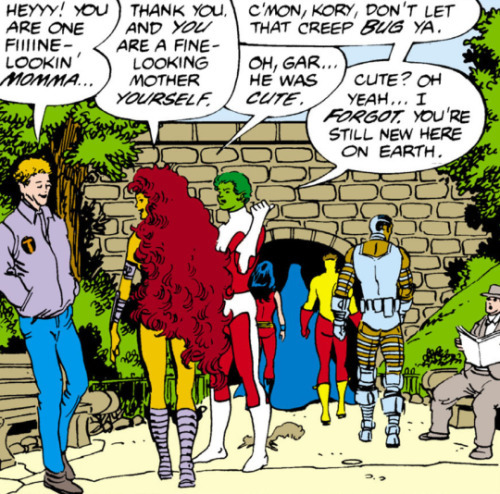
yes.
A scene where she's innocently naked in front of others and requires an explanation of why western culture finds nudity wrong and/or inappropriate?
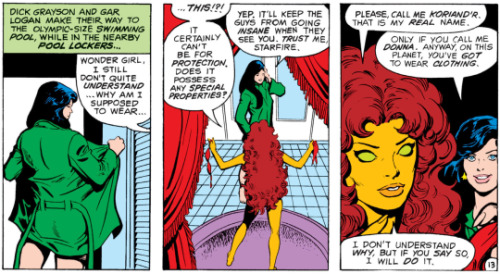
That's there, too.
However, for all this innocence surrounding Earth culture, Koriand'r is rarely seen acting like with the innocence of a child and displays deep knowledge of a variety of subjects that are both intellectual and physical. Her innocence and naivete in social situations on Earth comes not from having the mind of a child but from a cultural dissonance. Despite suffering for years in enslavement and having no formal education (or what we as an audience would define as a formal education) she intuitively understands how to operate a starship and makes a flawless escape from her captors in a ship we as an audience may assume she has never flown before as she was a mere child when she was enslaved:
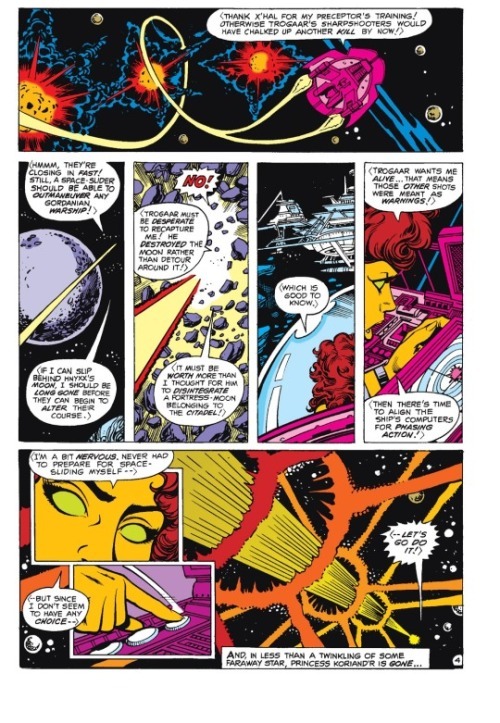
This is a skill that seems to come naturally to her and belies a greater understanding of technology than her Earth counterparts could boast of.
It's not just her technical knowledge that interests me, however, but her analytical skills as well. In New Teen Titans #33, during her search for answers about Dick's current whereabouts, she solves the team's problem regarding their villain of the week:
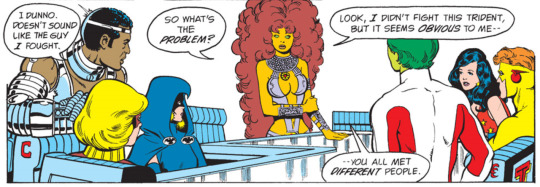
She listens to the team's descriptions of their individual conflicts with the villain Trident (previously thought to have been dead) and comes to the correct conclusion that there are multiple people masquerading as him. The scene is cut short by Tara insulting Kory's intelligence as she has interpreted Kory's beauty as being her only defining trait. Much like many comics fans, Tara has mistaken Kory's general kindness and cultural naivete for a lack of intelligence that Kory herself has never displayed. In the following scene, Kory's emotional competence is used to smooth over the situation and make clear that she won't tolerate being insulted:
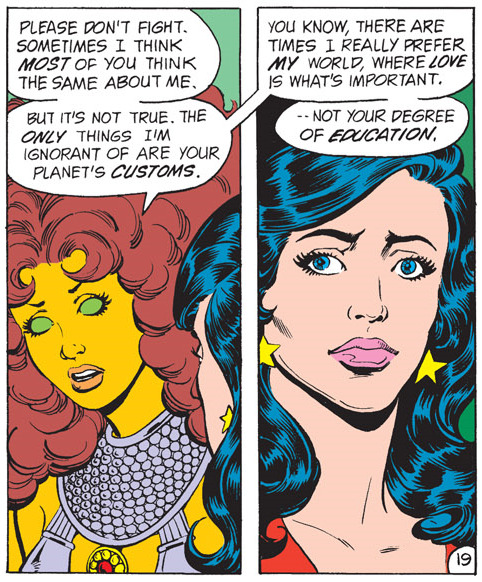
While Kory is not formally educated, she is analytically minded, extremely emotionally competent, and maintains a set of skills that the other Titans had to cultivate later in life as her culture and the other cultures she grew up exposed to are more technologically advanced than Earth.
While she did fall in love with the first man she met on Earth, she didn't idolize him or love him because she thought he was the most intelligent man she had met. Kory repeatedly stands up to Dick both for herself and for what she believes he himself needs. When he lashes out at her, she tempers both his and her emotions to ensure the outcome best for both of them and when he talks down to her she refuses to let it go unnoticed:

There are countless examples of the ways in which her character has been proved to be someone who doesn't require hand holding and is equally as smart and capable (if not more) than her teammates. Her character is one that is established to have a strong sense of her own needs, wants, and personal character regardless of the situation.
In addition to her subversion of the emotional and intellectual facets of this trope, Kory also has a variety of relationships outside of her romantic relationship. Unlike the traditional Born Sexy Yesterday, Kory isn't limited to having only one relationship and her scope of the world isn't limited to just Dick Grayson and their romantic relationship - her friendships with Garfield Logan, Victor Stone, and Joey Wilson are as deep and meaningful as her relationship with Dick (this is referring to how Born Sexies are often only allowed to have a relationship/friendship with the male hero of their story and no other men, this is not discounting her deep friendships with both Donna Troy, Raven, and Lilith):

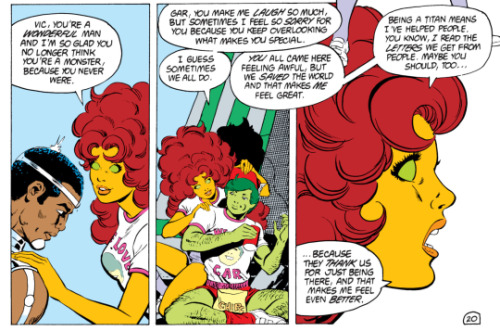
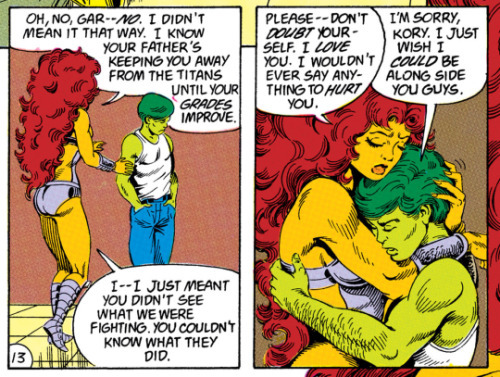
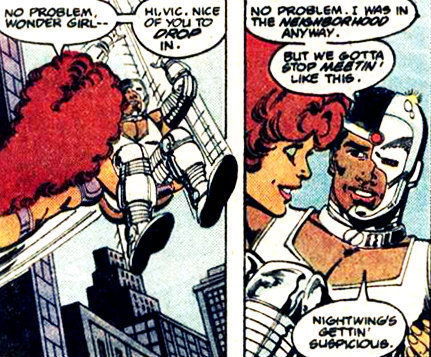
While Kory isn't a perfect subversion of this trope, she is the subversion of it that stands the test of time as a character who is both deep feeling and deeply intelligent which offsets any naivete she may have in regards to Earth and the wide and varied cultures that exist on our planet. I believe that her character represents how this trope can be subverted and how it can be eliminated from the science fiction media landscape as creators work toward creating media that is inclusive of women with actual wants, desires, and personalities.
this post is an updated and heavily edited version of a post originally uploaded here.
242 notes
·
View notes
Text
“Ancient” wlw ships
This is such a self-indulgent post but I need to get my thoughts out. Lately I’ve been thinking a lot about all the girls I shipped in fiction when I was a kid and didn’t realize I was shipping them.
I mean, they pretty much all had boyfriends or ended up marrying a man, and I was pretty much on board, in my eyes it was just some part of the story that needed to happen, because it always did. I think the common thing with these characters was that the female best friend was, at least more often than not, narratively more important than the guy, or just seemed to have a much greater emotional impact in the story.
Thinking about this has been so fun and eye-opening that I just feel like sharing a list of my biggest ancient wlw pairs that I only now, years later, realize were totally in love in my mind, I just didn’t have a concept for it yet. I’m sure that’s relatable for some people, but maybe there’s someone out there who was shipping these same characters??
This will include mild spoilers. And it’ll be long.
1. Cornelia & Elyon from W.i.t.c.h.

I COMPLETELY lived in these comics when I was 8-12 years old, and nothing in it was as compelling to me as Cornelia and Elyon. Guess I was already a sucker for best-friends-to-enemies-to-friends-again, even though I didn’t realize I also wanted them to become lovers. Best friends was all there was to me back then, that was the name I assigned to the highest form of love in my head. Which I still don’t see as invalid? I just didn’t realize I would’ve related to the romance aspect between best friends a hell of a lot more than I did to any of the relationships the W.i.t.c.h. girls had with their boyfriends. Cornelia and Caled was almost as bad as Buffy and Angel! Cornelia and Peter was just boring af. All the other W.i.t.c.h. girls’ boyfriends were all equally boring to me except for Will and Matt, but that was because their struggle to admit their feelings for each other was written in a funny way, not because their relationship had any actual depth.
But Elyon and Cornelia would’ve been perfect! I mean if your best friend has the ability to understand you so well, that with her magical intuition, she can draw you a picture of a guy you’re going to fall for, a guy she has never met... why would you even want to be with that guy anymore? Why wouldn’t you just be with her instead?? What Cornelia and Caleb had was limerence (I actually applaud the comics for eventually treating it as such and showing how it was harmful to both of the characters!) but what Cornelia and Elyon had was true love that transcends dimensions. Cornelia never gave up on Elyon, not even for a moment, after she became the W.i.t.c.h. girls’ enemy, and when she was in trouble, Cornelia had a hunch from another dimension, and she didn’t hesitate to come to her rescue. (The fact that during the same mission she also manages to fall for the dude Elyon drew for her in the past seems more like an accident, to be honest. The real deal was patching things up with Elyon, it was both more emotionally impactful AND more plot-relevant!)
It was also really sad to read the comics sometimes, because Elyon was absolutely my favourite character, and she wasn’t around much after the first arc, being a queen in another dimension. But every time there was a flashback to when Elyon was still living on Earth and being cute with Cornelia I was like MOOOOORE.
2. Sora and Layla from Kaleido Star
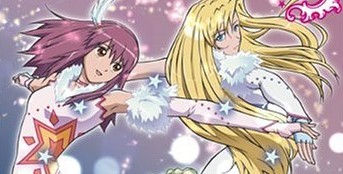
If you haven’t watched this anime you’ve missed. SO. MUCH. This is probably my favourite anime ever. And it features another type of ship I LOVE. Which is partners in some sort of activity, usually sports. When it’s written well it’s just so impactful and intense. These girls are routinely risking their lives in their passion for acrobatics, so they need to have absolute trust in each other. And oh boy is the relationship between them written well. I love it when two characters initially don’t get the way the other thinks or sees the world, but as they grow closer, it’s the other’s way of thinking that really unlocks something huge for them.
Also what’s so compelling about Sora and Layla is that there really isn’t anything like them in any other anime, that I’ve come across, at least. These partnerships are always between two guys in a sports anime, the partnership is at the heart of the story and the emotional stakes are so high it’s no wonder most people don’t want to ship these guys with their intended female love interests. Kaleido Star takes this even further because the guy who is in love with Sora is literally a joke, or the fact that he’s in love with Sora is a running gag, and nothing more. All the focus is on Sora and Layla as partners, and how they change each other's lives for the better.
Also the way Sora pines for Layla when she’s away or not paying enough attention to her is SO... I mean you don’t even have to think it’s romantic for it to absolutely melt you. Although it feels pretty heavily romantically coded, and it doesn’t even feel like queer baiting, because it’s just SO real and honest. And how Layla can’t stop thinking about how Sora is changing her as a person. There’s no question about the fact that the relationship between these women is the true meat of the show.
3. Anne and Diana from Anne of Green Gables

I read these books over and over again as a kid, and the Netflix show renewed my love for these two. They are kind of ridiculous, but SO cute. Looking back, it seems obvious that they had a crush on each other, they were just SO giddy all the time they were alone. Sure, you can excuse all their romantic gestures (like changing locks of hair, and vowing to never leave each other with joined hands and grand words) with saying Anne just romanticizes everything, but it never really felt like just that to me.
I’ll never forget how devastated Anne was about Diana getting married, and I don’t remember the wording but initially she wished she could keep Diana to herself for their whole lives. And every time they talked about marriage it was something they were both gonna do not as individuals, but rather the emphasis seemed to be on the shared experience, and how their children would be best friends and all that. It was all about them together. Like their romantic fantasies were nothing without the other somehow in the picture.
I don’t hate Anne and Gilbert but I don’t love them either. Gilbert has always been just sort of “meh”. He’s okay, but also the kind of love interest that can never compel me much.
4. Chocolat and Vanilla from Sugar Sugar Rune
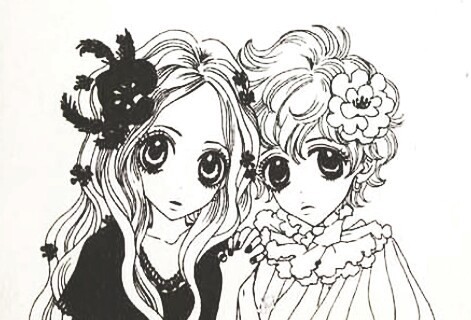
Seriously, this would have been SO GOOD if it was canon.
Think about it, best friends, chosen to compete against each other for the throne. These witches go to the human world to attract male attention and collect feelings from the men, turning the feelings into heart shaped crystals and whoever collects more will be the queen. I mean... the story was good as it is but if they had ended up together and been queens TOGETHER?? That would have been the best story. It could have had SUCH a compelling best-friends-to-competitors-to-enemies-to-friends-to-lovers storyline! There would have been room for so much character development.
And if my memory doesn’t betray me the story would not change much at all if they didn’t end up with the guys they do end up with! Especially Vanilla’s guy is like an afterthought and Chocolat’s guy is... well, a sum of my least favourite tropes, including the one that will remind everyone about Mortal Instruments a LITTLE too much, so he can get lost for all I care.
I cried many times while reading this, and it always had something to do with these two girls.
5. Yoko and Liao from Yoko Tsuno

Okay, these two might have a problematic age gap, I’m not sure, but I didn’t know of that possibility as a kid, they just looked the same age to me. I was a huge Yoko Tsuno fan as a pre-teen, and there were so many interesting female adventurers in this series but for some reason the dynamic between Yoko and Liao was my favourite, even though Liao only appeared in one album. I just really felt like I needed to see more of these characters interacting and where their relationship would develop.
There was something about them that seemed rather original to me then, and a nice change. The reader had already gotten used to Yoko as the hero, she was always saving the day everywhere, she was like The Doctor in a way and not only because she time-travelled. She is simply badass. In Liao’s story there’s a prophecy about a girl who speaks to a dragon and saves everyone, and Yoko thinks that girl is her because she’s from the future and knows the dragon is a machine, but it turns out to be Liao, and that was somehow really satisfying. Yoko treats Liao obnoxiously in the beginning, doesn’t give her much credit, but is deeply humbled after Liao needs to save her ass multiple times because she’s just too sure of herself. It was cool to see how Yoko really needed to grow in this story and realize her limitations, and how wrong she was to treat Liao the way she did and look down on her just because Liao was physically weak, had a temper, and came from a much earlier time period than Yoko.
By the end they are clearly very attached to each other (Liao weeping in Yoko’s arms and Yoko confessing how full of herself she was when they met) and respect each other, and I just really would’ve liked to see where they would go from there. I thought about them meeting again A LOT when I was a kid.
That’s my big five! :D I could go on but this is already long, I need to sleep, and these are the characters that I’ve been thinking about the most lately. If you read this far for some reason it would be cool to hear if you have any similar (or different) experiences.
#old ships#wlw#w.i.t.c.h#kaleido star#yoko tsuno#anne of green gables#sugar sugar rune#personal#rambly
66 notes
·
View notes
Text
SNK Meta Part 2: Ymir
In my previous post, I talked about my feelings regarding Historia's character this final arc. Now I'm going to talk about Ymir, her relationship with Historia, and my feelings about her send-off.
Was Ymir a good character?
In my eyes, yes. When she was first introduced, it was clear that she had feelings for Historia, making her one of the only canon queer characters in the series (assuming Historia reciprocated those feelings, which I'm pretty sure she did). She also appeared very snarky and cynical, but us readers came to learn later on that there was a much softer, sensitive side to her deep down that Historia would be the first to witness. These revelations, including her backstory, helped flesh out her character in a way that made her very interesting and mysterious for me. I especially loved how sharp and intuitive she was. I'm going to quote the wiki on this part, because I think it does a great job explaining her impressive observant abilities. "Ymir was extremely perceptive and could discern the nature of the people around her with alarming accuracy, such as Historia's martyrdom mentality, Reiner's split personality disorder, and Sasha Blouse's desire to look good in front of her peers by hiding her native accent and developing an extremely formal way of speaking. Due to her experiences and belief in self-pride, she tended to rudely criticize people for being untrue to themselves. Furthermore, Ymir was very reasonable, as she knew what to do during her kidnapping situation and reconsidered her options to accomplish her goals." I also enjoyed her interactions with other characters besides Historia. Take Connie, for example. When he lamented over the possibility of his mother being stuck as a mindless titan, Ymir tried to distract him, albeit not in the most appropriate way (ch. 38).
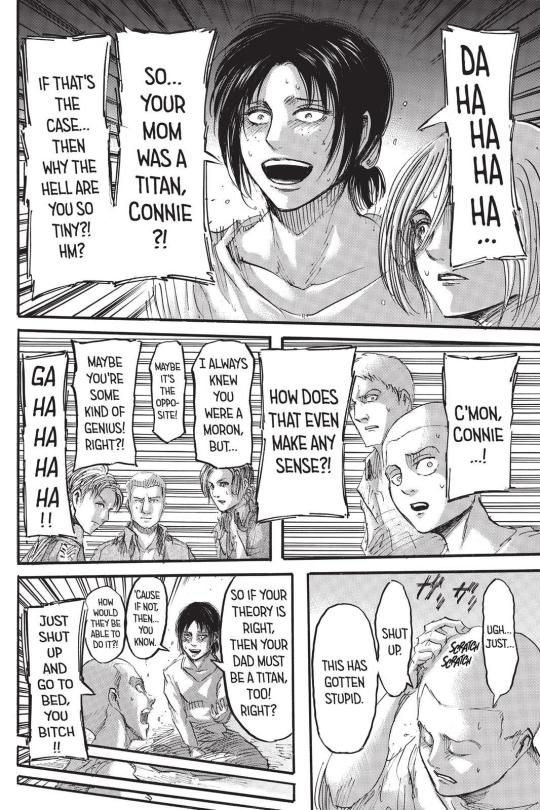
Connie complained about this behavior later on, but Historia defended her, explaining that she was only trying to stray his thoughts from that traumatic discovery. There were a few more moments between these two that were fun to see as well.
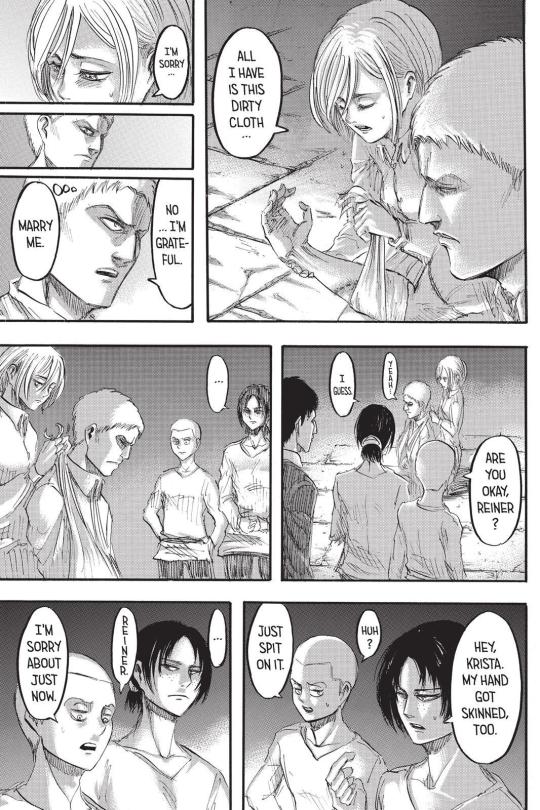
😂😂😂. Ymir's looking at him like, "You ruined it, Connie..."
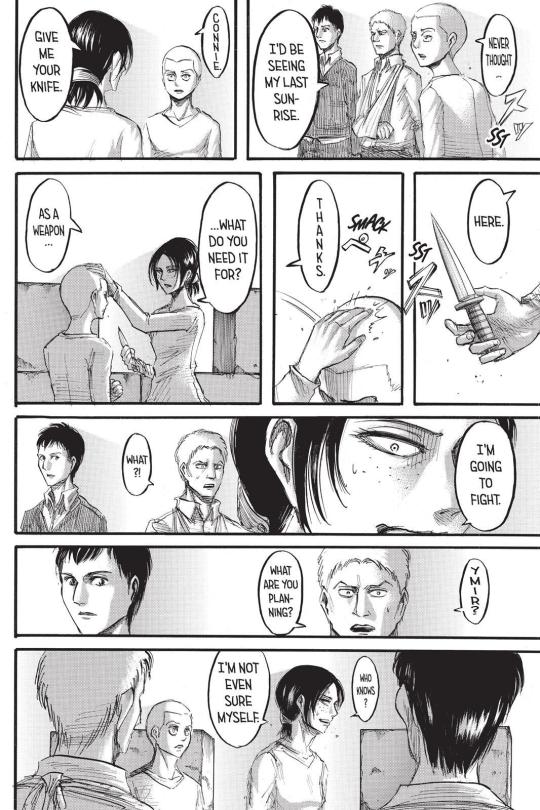
I love the way she pats him on the head. Knowing how much taller Connie's gotten I don't think she'd be able to do that anymore.
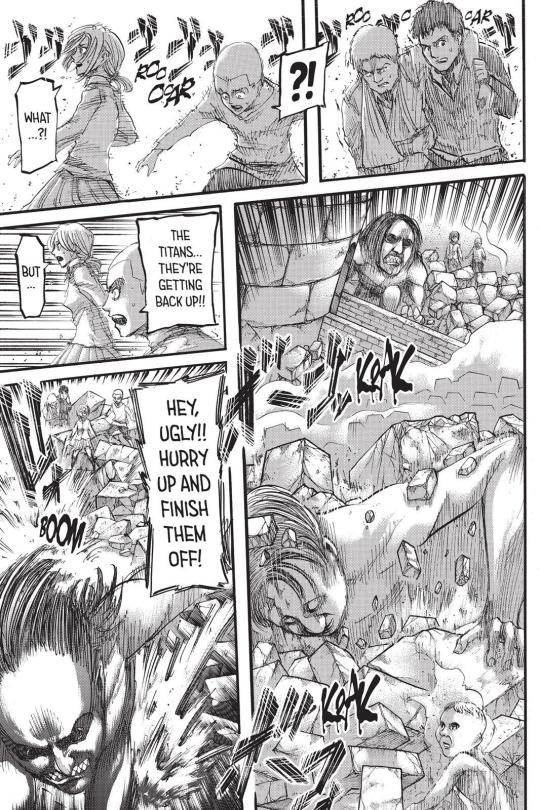
This becomes one of the many times that Connie calls her "ugly" when she's in her titan form. Too bad she couldn't talk very well as a titan or else she probably would have had a smartass remark to throw back at him. It's looking back on scenes like this where I wish we could have gotten more out of these two. You can tell she cared for Connie and I know he also cared in his own way.
We only saw her together with Eren once when Reiner and Bertholdt captured them, but it was very interesting to see their perceptions of each other.
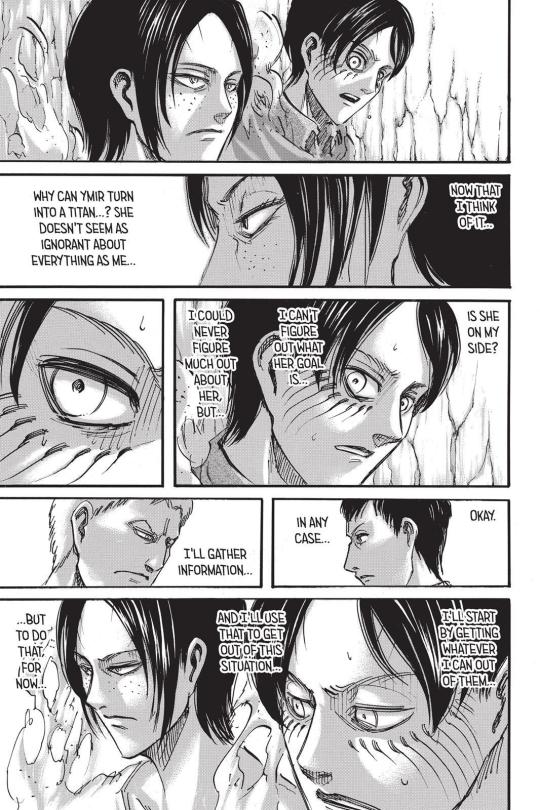
Eren found Ymir to be mysterious and wasn't sure if he could trust her, which isn't surprising considering this was the only time they ever spoke to each other. One detail that he couldn't miss, however, was Ymir's undying determination to protect Historia, a goal they would both come to share later on. Meanwhile, Ymir couldn't trust Eren because she found him to be too reckless and hot-headed.
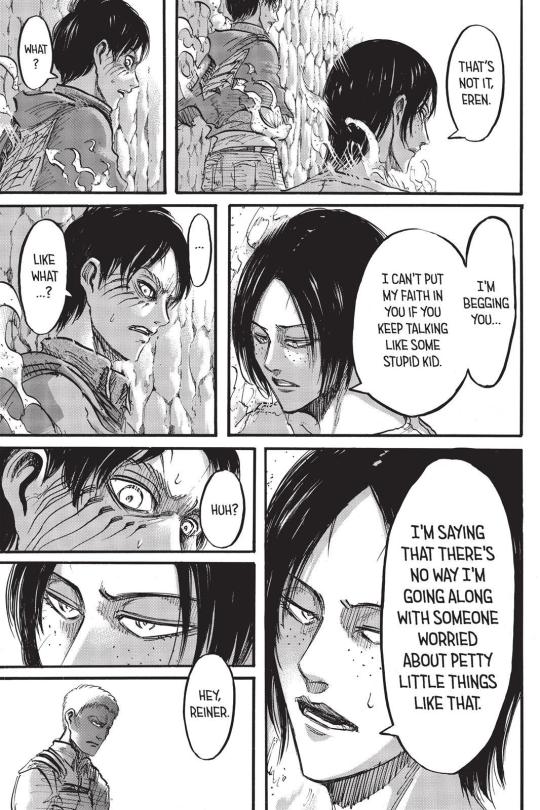
These were my favorite qualities from Ymir, although to this day I still question the rationality of leaving Historia behind considering the situation she's currently in. Historia herself called her an idiot after reading her goodbye letter. Now that I've covered my reasons for liking Ymir as a character, let's move on to her relationship with Historia.
Ymir and Historia
I've loved these two together since the beginning for their complex and amusing dynamic. On the surface, you had the selfish, confrontational tomboy and the girly, kind and beautiful goddess. But underneath were two young women who were dealt a dirty hand early in their life and lead empty lives as a result until they found each other. Their story arcs throughout the Clash of the Titans arc were beautiful and complimentary, and it's part of the reason why it's actually my favorite story arc in the series. Everything from Ymir seeing through Historia's charade and urging her to live her life with pride to Historia telling Ymir her real name and the two of them fighting side by side in chapter 49 was some of the most empowering moments for me and I will forever cherish those parts of the story.
Ymir's departure
And now the part I've been most excited to talk about! Ymir's glorious, memorable and emotional departure.
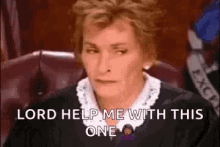
Her ending...was not what I expected it to be. She left Historia at the very last second and gave herself away to the enemy because she felt guilty for something that was not her fault. Now as we know, Ymir is selfless at heart and she felt indebted to Reiner and Bertholdt for inadvertently helping her return to her human form after 60 years of wandering the earth as a mindless titan. She also decided that Historia might be safe after all after learning that Eren possessed the coordinate. I understand all of that, but what I don't understand is...well...everything else.
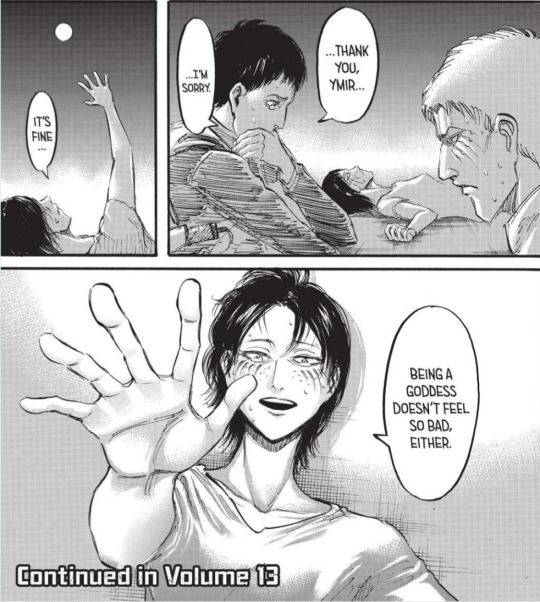
This was Ymir's last real appearance. We see that Ymir has willingly chosen to accompany Reiner and Bertholdt back to Marley to give up her titan powers at the cost of her life. Many people weren't so sure if that was truly the last of her though, because her death was not explicitly confirmed for a long time. We spend the next 33 chapters hoping to get something more, and then this happens...
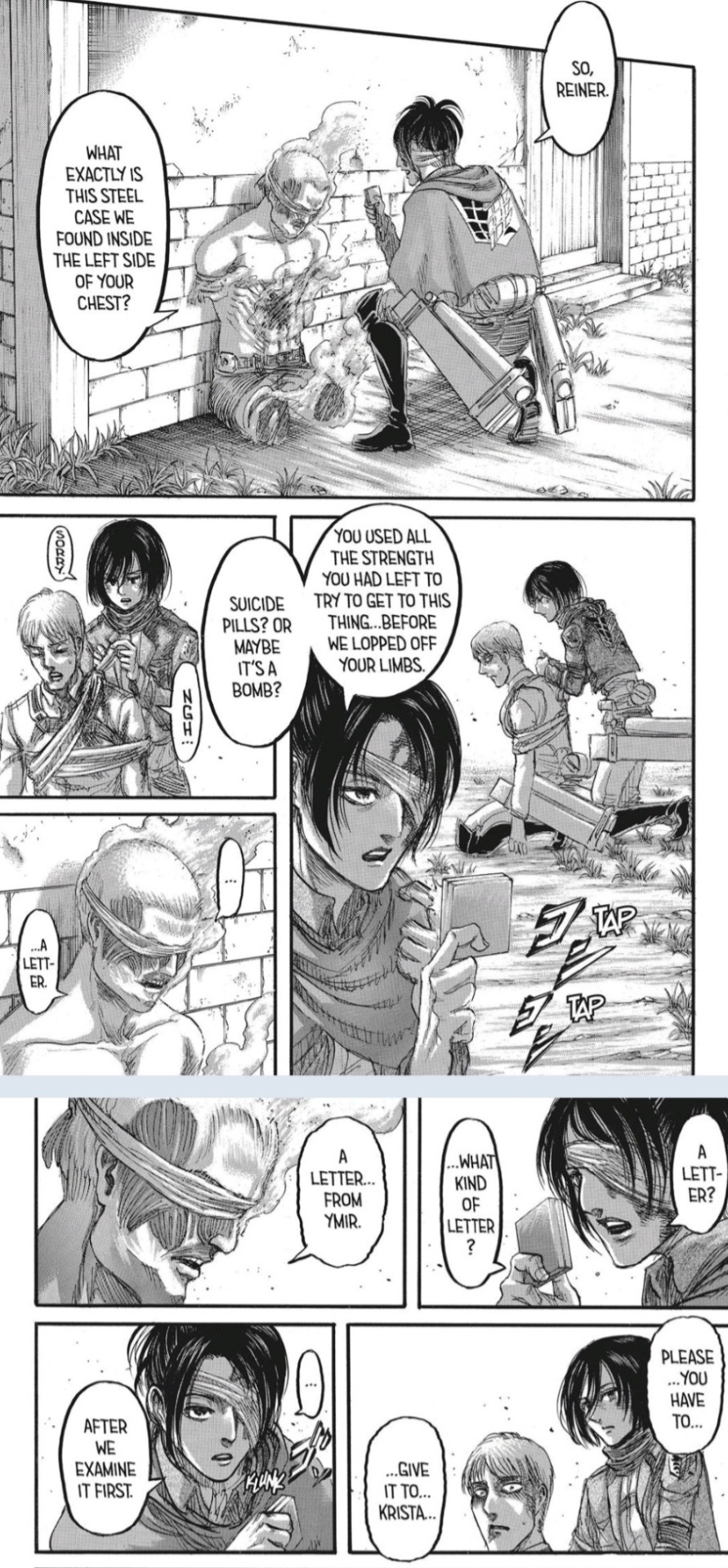
A glimmer of hope. Finally there's a real chance we'll hear from her again, and it's got a lot of people buzzing with excitement. Sure enough, we finally get to see what's in that letter a few chapters later and are given Ymir's backstory. Here's where the disappointing part comes, though. Ymir makes it clear at the beginning of her letter that she will be dead by the time Historia receives it, meaning that this is the only goodbye they're gonna get. The last time they saw each other, Ymir wasn't even in human form. Instead of a proper goodbye, all we get is a short letter. The anime even tried to fix this by giving us Ymir's backstory earlier, but by doing that, her letter was cut short by a lot. All that was really left was, "Hi babe, sorry I left you like that. Oh well, I'm about to die anyway. Sorry we couldn't get married." And then this happened:
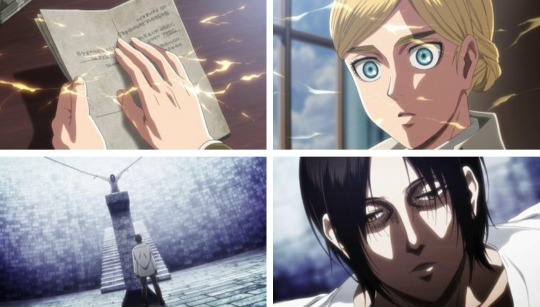
Historia touches Ymir's letter and is suddenly bombarded with visions of Ymir's past, including her chained up and about to be eaten. That is definitely not what happened in the manga and its honestly very confusing to me. How was she able to see all of that just by touching the letter? I get that she has royal blood and was able to access memories when she touched Eren, but Eren is a human who just so happens to possess the founding titan. The letter is just a piece of paper. Also, I'm guessing the last thing Historia saw was Ymir chained up so that there will be no need to bring her up again like Reiner and Porco did in chapter 93. I don't blame the anime team for making that change because I'll be honest, when we saw that one panel of her in her death chamber it felt very out of nowhere and I had a hard time concentrating on the rest of the chapter after that. So here are my main problems with her death:
1. It was off-screen
If I recall correctly, Ymir is the only major character in the series whose death was off-screen. All we got were her final moments, and there wasn't even any dialogue. That part especially bothered me because you can see that Ymir and Porco are looking at each other and Ymir's mouth is slightly open, implying that she's speaking. But what was she saying? You seriously don't mean to tell me that they both just sat there and stared at each other the whole time. She must have had some last words, but for some reason we never got to know what they were. At one point I even thought that Historia and Porco might cross paths at some point and he would be able to give her closure that way but no. No closure, just a last minute goodbye letter and a glimpse of her final moments that I now consider completely useless and unnecessary because we never got more out of it. I mean really, we even got closure and an on-screen death for Marco for crying out loud. Why give him that kind of attention and not Ymir? Not to mention one of the more recent guidebooks. Her character has the diceased sticker and it talks about how she went back to Marley with Reiner and Bert, but that's it. Not even the guidebook makes it clear what happened next. Yeah she died, but did anything else happen before then? That's what I wish we could have gotten more details on like, I don't know....her final words???
2. It was anticlimactic
We didn't get enough focus on Ymir's point of view after leaving Paradis in order for her death to have any kind of lasting emotional impact. As I mentioned above, it just felt out of place and messy. There was nothing memorable about her death either. It was quite simple and boring.
3. It contributed to an ongoing literary issue that has anti-LGBTQ roots
Yep. I'm talking about the infamous Bury Your Gays trope. Now before I go any further, I am not accusing Isayama of being anti-LGBTQ, I'm just shedding some light on something that's been continuously repeated in countless forms of media, not just anime and manga. Truthfully, I hadn't heard about this trope before reading Attack on Titan, but when I did hear about it, it only made Ymir's death even worse for me. I'm not surprised that it exists and I realize that this is a manga where death is inevitable, but keeping both women alive in the end would have certainly been very refreshing. At this point, all I could ask for is that Ymir and Historia get to see each other one last time. Obviously since Ymir is dead it will have to be through other means and I don't care how it's done. It can be in a dream, a vision or through Paths (which I think would work best). Seriously, there's nothing I've been more curious about than how Ymir would react to Hisu's current predicament and what she would say to her. It would just be great for them to have one last conversation face to face because for me, the letter just wasn't enough. Of course I'm hoping for too much, though. We've only got 1-2% of the story remaining, leaving no room for further closure. It's disappointing and frustrating, but no story is perfect. I'm grateful for the content that we did get, but I hope one day I can find a story like this one where the queer characters get to live for once. I'm aware of other shows like Steven Universe, Adventure Time and Yuri on Ice that give them good endings, but those shows are much friendlier towards younger audiences and aren't nearly as dark and grim.
Conclusion
Ymir was a very intriguing character while we had her, but her death was unsatisfactory and only left us with more questions. I am not going to trash Isayama for it, but I will leave this critique here so I can unload all my thoughts for others to read if they wish, or possibly share their own thoughts. We are coming close to the end of the manga, so now would be a great time to reflect on what we read and enjoy what's left of it.
29 notes
·
View notes
Text
Saying Goodbye to Flower of Evil
So it's finally here, time to say goodbye to my favourite kdrama so far of 2020. This is my post to say goodbye and also go back on all the positives and negatives of the show. It's been a long, beautiful and heartfelt journey. This show means a lot to me, and I had so much fun analysing it, every single week. Let’s start the review:
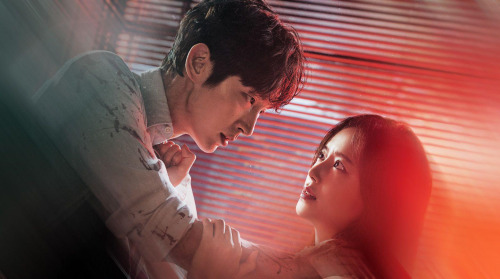
Ratings: Plot: 8.5/10 Directing: 8.5/10 Acting: 8.5/10 Satisfaction: 8/10 Overall: A Rewatch factor: 7/10
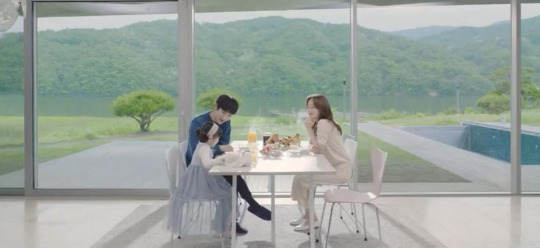
Opinions and Criticisms
What can I say about this show that hasn't already been mentioned and discussed? What an amazing show. At the end of it all, Flower of Evil is a love story to the core, it focuses on the marriage between our main characters, and we the audience end up invested in watching the layers and truth of the marriage unfold, the psychological circumstances and the external circumstances that lead us to the factors that will end up either breaking the marriage into pieces or end up bringing an opportunity for healing and unconditional love.

Characterisation
This show in my opinion subverted character tropes, in the first episode we're left feeling confused about who to root for; Do Hyun So starts of a scary personality but we start to see him break down and we understand that we didn't have all the information about him. In the first episode we feel the exact worry and fear Ji Won also ends up feeling as she slowly uncovers her husband is not who he claims to be. But we also like her start to look deeper for clues to help find the real truth about the psyche of Hyun So.
We're introduced to characters at the beginning such as Moo Jin (very ableist at first, and problematic) only to see him become 3D and learn from his mistakes and show care for Hyun So and his ex love Hae So. Like with him, we also feel weary about every character when they first appear, even Hae Su who we even feel led to believe is the mystery serial killer accomplice at the start ends up being a character broken, we see how it actually affected her mind and patterns as the guilt ate her up for what happened to her brother. These are just a few of the characters the audience grapple to understand and start of mistrusting.
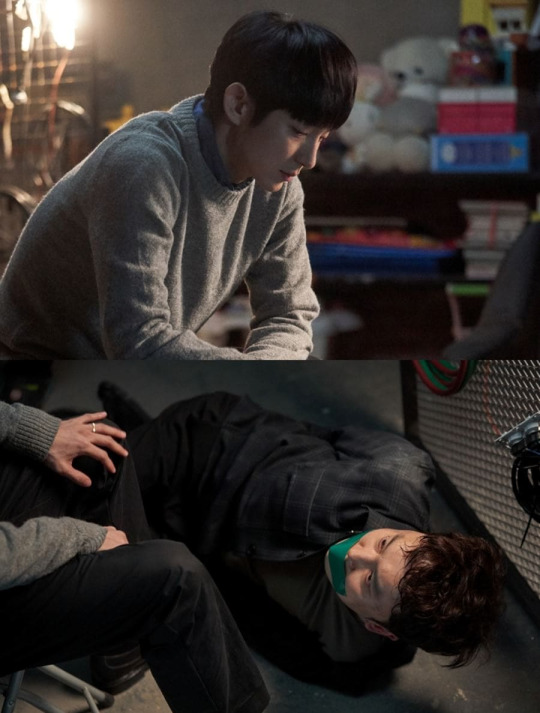
Subverting Expectations
The tropes are subverted because this is a thriller, expectations are thrown out the window and changed, when one of our main cops find out about Hyun So's real identity (the show built this up so well since we know from the beginning that he's curious and very intuitive with cases), we expect him to take in Hyun So and be prejudiced,. It’s a surprise to see he's not , he listens and understands that Hyun So isn't what everyone thinks he is. The other cops do the same as well when Ji Won is 'held hostage' by Hyun So. They don't blame her immediately as an accomplice and only worry about her safety. The cops end up becoming like a found family, the warmth, loyalty and trust with everyone including the chief was shocking to see, and yet the show made us hang on edge for a while to see these characters stories unfold. Yes they're more 2dimensional than 3D but they are important to the story and end up being characters we love and enjoy on screen.
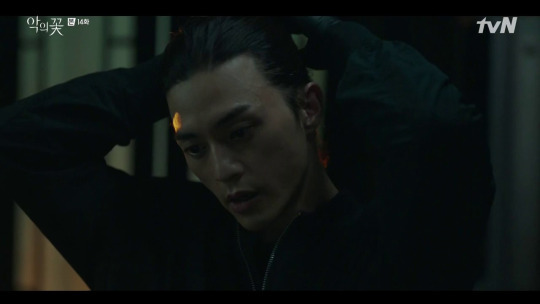
I don't have anything bad to say about this show, I even enjoyed the reveal of the villain, Baek Hee Sung, his storyline whilst seemingly making him a very straight forward psychopath, the subtext of the show suggested even more dimensionality and depth to understanding his family's psyche, circumstances and reasonings for why they aided him. He's also a brilliant foil to Do Hyun So who was using his identity without knowing he's the real accomplice we were waiting for. The actors do such a good job in this show, the main couple have great emotional ranges needed to carry the painful, hurtful, alarming scenes. Props to my two favorites, Lee Joon Gi as Do Hyun So was such a perfect casting choice for this show and Kim Ji Hoon as a villain was so delicious to watch, he made me scream and squeal a couple of times. Both so addicting and entrancing to watch on screen.
Lacklustre writing for Females
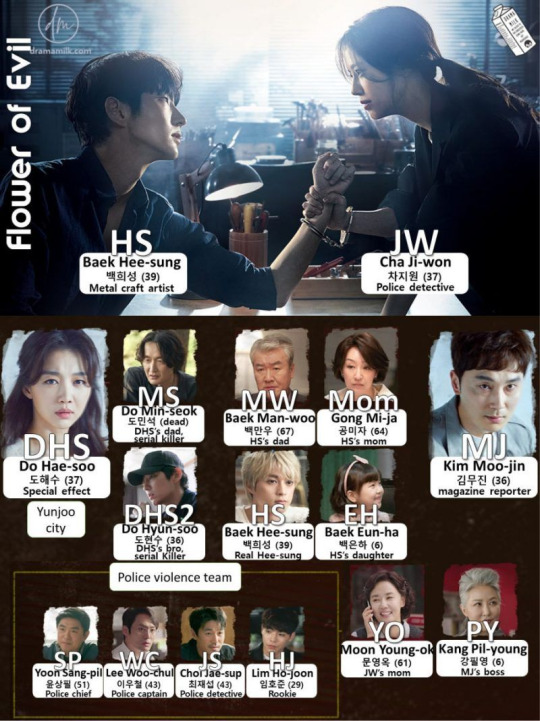
Eunha
As much as I am satisfied with the ending I do feel there are parts that a bit lack luster. The use of the daughter in the story of Do Hyun So regaining his memories and choosing to accept Ji Won yet again could have been used more, in fact I thought she was going to run away or do something defiant causing Hyun So to panic and realise he does have feelings and care. (I thought that was what they were building up to when they showed the food in the fridge he kept buying for her without knowing why) But she's pushed to the side, and almost forgotten about until we get a reunion. Eun Ha was such an interesting character to look into and I would have loved more depth and use in the storyline especially when she's connected the most to the humanity of Hyun So. Instead we got the diary scene and the title of the metal workshop being connected to Ji Won and his love for her all along. Don't get me wrong the romance was the basis of the show, so it makes sense we end with it being the most focused part on the conclusion of the show, I just wanted more Eunha.
Do Hae Su
As much as I enjoyed the characters in the show, I felt the female characters apart from Cha Ji Won were written to be very stupid, emotional or just an obstacle to their male counterparts. This irked me for a while, Hae Su's best part is when she sacrifices her life for Hyun So but before that she acts rashly and keeps on doing things that no one wants her to, I almost face palmed when she went straight to the director after finding out someone in his hospital is the accomplice. Like it's not hard to put two and two together. I enjoyed her as a character but did feel like she was underused more than her male counterpart Moo Jin. I'm glad we get her resolution and she survived
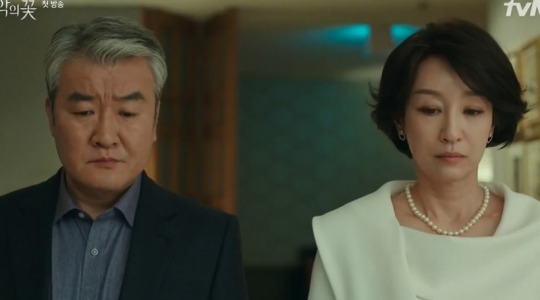
Director’s wife/ Unmother
The director's wife/Baek Hee Sung mother shows potential of being a character with depth and aims, but she also becomes sidelined once her son wakes up, her struggles in her psyche for her new fake son and grand daughter vs her guilt of hurting her real son, was a really good dynamic to explore, but she ends up becoming weak and panicking and being taught by both her male counterparts her son and husband. She just ends up being in the background and seen as the less smart, cunning and clever one compared to them. Didn't really like that, I thought she would be part of the downfall of our villain but she just ends up wasted instead.
The maid of the Baek’s
Don't get me started about her maid, another female character who is fridged on the show, I thought she was written so stupid towards the end for the convenience of the plot, and I hated that she reacted the way she did knowing the truth she knew. Her outburst and blackmail tactics just felt so out of the blue, it annoyed me to no end. I wish she had a reason that was hinted throughout the show, quotes or scenes that hinted she would betray them for money, more depth shown with her relationship with her and the wife, but no she just reacted out of bounds and got murdered. It was just a bit blase.
However I'm not saying this show did not also have powerful women characters, well character, Ji Won was smart, cunning and I enjoyed watching her actions after she discovered who her husband was. But for me I would have preferred more females written the same way she was that's all.
The final moments
I did enjoy the message of the show, especially when looking at what made our characters become/ turn into percieved psychopaths, the connection of Do Min Seok with both Baek Hee Sung and Do Hyun So was interesting to look at, and the way the world treated Hyun So because of his disorder was also painful but written well in the show. One of my favorite scenes in this show, is episode 15, (i wished the show's ending was episode 15, it would have left a haunting effect on the audience but i like happy endings too), when Hyun So proclaims he sees dead people so he can't believe Ji Won is alive. It was a brilliant build up as the ghost of Do Min Seok had been all along a foreshadowing device for this moment, immediately he said that it shocked me and made me realise what the writers planned all along. It was always right there in front of us that this will be an issue, and they used it so well for episode 15. One of my favourite moments so far in kdramas of 2020.
The message of the show is simple don't judge someone based on their mental disorder, they're just like everyone else if given the right opportunity to feel, and be treated like normal people.
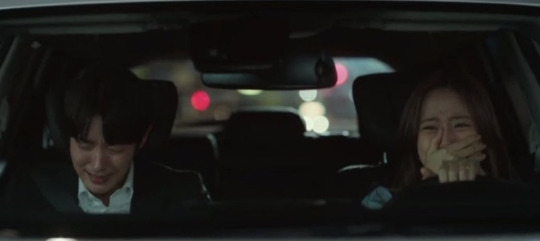
Analysis and Devices used
Onto the devices used for analysing this show:
The themes
I enjoyed the topic of Psychopathy, Trauma and Mental Health that was relayed through out the show, what makes a psychopath a psychopath nature vs nurture. I enjoyed how each character's needs and wants is revealed to us subverting tropes and keeping the audience questioning the reasonings and truths of each of them.
The parallels
I also liked the directing parallels when they show both Hyun So and Cha Ji Won doing different things but it connected to the actual plot/storyline of the show for example him uncovering who his dad worked with to get raw materials, and she also uncovering a fake employment scheme with the someone connected to the same person who Hyun So is meeting. They do this all the time, and it's a great way to make the audience feel on edge and worried that soon both her and Hyun So's path will have to meet and she will have to confront him on the truth of their marriage.
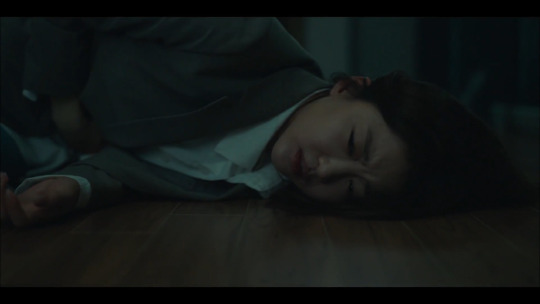
The Foreshadowing
There's heavy use of symbolic foreshadowing, dramatic irony and withholding of information all used to keep the audience on their toes with bated breaths. The genre was part thriller, so each cliff hanger was deviced well enough to show case some realisations (some painful and horrifying) and also used to make the audience go back on their own expectations and wait to see the story unfold. At first the show starts of like a murder detective show, and I liked how each of the murderers/crimes were connected to unveiling the truth about Hyun So and his father.
Some foreshadowing devices I enjoyed is when Ji Won's identity card gets smashed and handed to Hae Su, at first we don't understand why there was such a scene but it uncovers and we find the horrifying conclusion that Hae Su will get stabbed because the killer misunderstands her to be Ji Won. Each of the devices used end up coming full circle in the plot to keep the audience on edge or hurt and broken at the realisation of what it meant. I look foward to watching another show with this writer and director again.
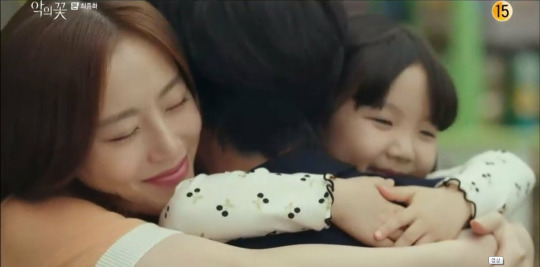
In Conclusion
This Kdrama surpassed my expectations and even beat my predecessor Psycho but it's okay as my favourite shows. While I did have some issues with parts of it, even with those issues I was left emotionally invested in this show, the characters, the story unfolding. I enjoyed every little thing in this show, I ended up being so effected I cried many times. As a writer, it taught me how to write a good love story, a couple against the world, and how to keep an audience invested.
34 notes
·
View notes
Text
Okay, now that I’ve gotten all the Bad Batch controversies out of the way... I can finally talk about the actual damn episode properly.
Like I said on my whitewashing post, overall I liked it, but I am kinda hesitant for reasons I explained there. I now want to focus on the actual story itself on its terms, and see how I feel about that. Apologies if I jump all over the place.
Probably my biggest issue narrative wise was that I felt some of the stuff around Crosshair was a bit contrived. Like, I was fine with him going full GOOD SOLDIERS FOLLOW ORDERS and all that, my issue is that I feel like the others took a while to realise he was following Order 66. Like, Tech even says he can’t be certain their mutations entirely screwed up their programming, with the camera even cutting to Crosshair. And like, before that Crosshair is berating Hunter for letting Caleb escape. When Tech said what he did, I feel like Hunter should’ve probably said something like “that must be why Crosshair tried to kill the Jedi”. Granted, it probably would’ve then led to questions like why Crosshair’s genetics let his chip work and not the others (something that isn’t answered, but it’s not something I felt that needed to, different genetics affect things in different ways we can’t always predict), but like, when they’re on Onderon and Crosshair’s like “yeah let’s shoot literal child refugees”, I feel like they shouldn’t have just conflicted with him, they should’ve outright wondered if he was falling for his programming. It doesn’t break the episode for me and I guess they probably just assumed Crosshair was being his usual dickish self, but I guess that also is a reminder that this is the second time we’ve seen him, so we don’t know if he’d normally be up for killing innocents if a mission requires it (since TBB are still given missions, their thing is they just do them the wrong way). It’s just like, you’d think at least Tech would make some comment about it. As Saw said, he’s supposed to be the smart one lol.
On the topic of inhibitor chips, I was surprised that Crosshair’s was only partly working. I guess it’s because he still had a level of personality to him? The more you know, I guess.
I do think the Bad Batch work better here as many have said, I guess probably because they’re the focus of the story so they have more room to show who they are and nuances to that. My favourite is probably Tech, I tend to gravitate to the nerd characters in things. Shame he has to look so fucking white for being a clone of a brown man though. :/ Kinda like Wrecker too, even with the issues HE has too. Great, even in my main comments my issues with them are popping up. :v
On that note... I do appreciate the idea behind the Bad Batch, being clones who turned out different and it’s about accepting and embracing your differences. It’s just in execution, it’s a bit of a mixed bag. Like, it could be a commentary on things like ableism, but thing is, these characters are basically superpowered (if people weren’t fixated on bashing women they don’t like and were equal in their vitriol, you could EASILY call the Bad Batch a bunch of Gary Stus). It’s one of those things where a sci-fi/fantasy allegory is well intentioned but because of things that don’t apply to our reality, the allegory kinda falls apart. Like yes, “be nice to people different to you” is one thing, but it does lowkey feel a bit like “they’re judged because they’re better than everyone else, those stinkin regs are just jealous”. Well no jealousy is shown in the episode, in fact a normal clone calls them defects... which is weird because even if yes TECHNICALLY they are, they’re basically presented as turning out different, but those differences are things that are beneficial to them, and not impairments. I guess I feel like the message would be stronger if they actually had major weaknesses, aka why they’re “defective”, but their strengths are something they excel at so much they’re allowed to serve (which I GUESS was the idea, but we don’t know what made them defective originally and what got their mutations enhanced). And yes, you can infer things like Wrecker being “dumb” (which has its own issues, and even then he’s still competent enough on a battlefield, honestly he might even be more just impatient and impulsive and thus can’t sit still to learn more complex things), but yeah. It’s kind of a mixed message here, I appreciate what they’re going for, but like many fictional allegories, it kinda falls apart and it’s also presented in a very individualistic way.
Okay let me say something positive: AZI-3 IS BACK! I assume he got memory wiped so he wouldn’t have any memory of Fives, but I really liked him in the Order 66 arc of The Clone Wars so I was happy to see him again. Well, until he was hit with that stun blast. I hope he’s okay and able to be repaired!
Echo’s attack with his probe arm thing is pretty cool. It was also cool seeing how he was integrating into the Bad Batch. I also theorised he was most likely to be immune to the inhibitor chip out of the group, because while I felt the Kaminoans wouldn’t overlook inhibitor chips in even mutated clones (they do explain that they kept them around because they were always successful at what they do despite their unorthodox tactics), I had a feeling that the Techno Union putting all those cybernetics in his head maybe screwed with or even removed the chips. Get the poor guy some skin colour though.
I have also seen some people bring up the potential issue of ableism with Echo given he’s an amputee with prosthetics, but I don’t have much to comment on in that regard. But yeah, using disabled bodies for shock value and it being seen as a measure of humanity like in The Bad Batch arc of TCW is a trope I could really do without.
I’m liking Omega so far. She’s definitely got a different vibe to other kid characters we’ve gotten in these shows, probably because she was raised on Kamino. Also appreciate that her voice actor is New Zealander too (she’s not Maori which would’ve been the ideal, but was born to Indonesian Chinese parents). Her curiosity makes a lot of sense, she’s not just mischievous because kid. Was nice to see Hunter open up to her too.
I’m intrigued to see where they take Crosshair. IDK why his genetics allowed his chip to still work, but it’s nice to see at least one of the Bad Batch follow Order 66. I guess they decided against it for more (as much as I’d liked to have seen it) because Order 66 doesn’t just make clones decide to kill Jedi, it basically removes any level of humanity and personality they may have developed and makes them basically stormtroopers. That, and well they want our heroes of the show to be the Bad Batch, and that can’t work if they’re now the goody two shoes batch.
On the topic of Crosshair, my favourite scene in the episode was actually when Omega talks to him. She tries to empathise with him, and whether she’s just naturally intuitive or is Force sensitive in some way, she can tell that Crosshair despite everything seems to be struggling, and it’s ultimately beyond his control that he’s like this now. And then he’s off to get his chip working at full capacity and is now a full on Imperial, RIP.
Also yeah, I’m on team “Omega is Force sensitive”. It’s possible she just has some heightened abilities because she’s an enhanced clone, but the way they framed her firing the blaster especially just screamed Force sensitivity to me.
On the topic of inhibitor chips, Crosshair proves that it’s possible to make them stronger, so it does potentially mean that if members of the Bad Batch are captured, their chips could be dialed up to make them loyal Imperials. I guess one could also wonder if they could be slow for the effects to come into play for some of them, so some maybe slowly turn later on? I doubt they will go that route because they probably want to keep all our heroes around, but it’s something, especially if they eventually conclude they have to remove their chips to be safe.
Seeing Saw in the first episode was surprising but also pretty cool, especially with how the model is transitioning from his Clone Wars appearance into Forrest Whittaker. Love how he sees right through Palpatine’s bullshit, especially when he makes that jab at Tech that seems to be a bit of a blow to his ego, lol. Some have wondered why he’s so chill here, but you have to remember this is early days Saw. He’s still cautious, but he’s not paranoid and overly violent. The way some of those refugees reacted to the clones does make it seem like there’s already Imperial forces occupying Onderon (well, they’re literally out in the forest at a camp). Mainly bring that up because I have to wonder how much time has passed, and how quickly Imperial forces showed up to Onderon.
Seeing Tarkin be a dick is always glorious. He just goes everywhere and KNOWS he’s in charge, lol. It was also interesting how even if he’s feeling like he’s ready to abandon clone forces, he sees potential with Clone Force 99 if they can follow Imperial doctrine.
The Kaminoans also seem distrustful of the Empire, not because they’re against it but because they want to keep their current deal. Maybe if Tarkin heard them out the Empire would have a better army, lol. Taun We from AOTC even cameoes. I do wonder what’s eventually going to happen though, given the clones are obviously abandoned in the end, I wonder how the Kaminoans are going to take it.
Also, Nala Se is back. Yeah, THAT Nala Se. Wonder what she’s doing with Omega as her medical assistant, lol. Oh yeah, she also stopped the doors and let the Bad Batch escape. I have no idea what she’s planning, but I feel like she’s being shady, given not only the Fives stuff but also because despite having a fondness for Omega she does seem like she’s very controlling of her (after all, she’s just property to her), hence why Omega wants to get out and be with the Bad Batch.
Okay, I think that’s everything I wanted to say? But yeah, have a lot of reservations, but still curious to see where this goes despite that.
4 notes
·
View notes
Text
Marty Stus can fit any Mary Sue Tropes, but some are more common with Marty Stus than Mary Sues and vice-versa. Some of the most common types of Marty Stus are:
Manly Stu: Probably the most common Marty Stu and the most likely to have all or most of the Common Marty Stu Traits above. This character has reached awe-inspiring levels of manliness through pure authorial favoritism. Nine times out of ten, he is written by a male author, with variable levels of Wish Fulfillment tossed in. You won't see him dwell often on romance, if ever, since Real Men Hate Affection. Also usually a God Mode Stu.
Alt. names: Marty Stu on Steroids, Manly Man Marty Stu, Macho Man Stu
Romantic Stu: This sort of Marty Stu is much "tamer" than the Macho Stu, and is much more interested in his Love Interest. In fact, he's more intuitive to the needs of his beloved than most men in Real Life would ever be. He might be a bad boy, or Troubled, but Cute, or this may be just an Informed Attribute. Either way, he's everything a girl would dream of in a guy. He's often written by a female or written to get females interested in the story.
Alt. names: Lovesick Stu, Romance Stu, Love Sickening Stu, Romeo Stu
Uke Stu: Taking Romantic Stu a step further, there's the Uke Stu. He's the polar opposite of Macho Stu and is more than just In Touch with His Feminine Side. As the name implies, he's likely a character possessing the traits typically associated with the 'receiver' in Boys' Love and Yaoi. If he's not gay, he's probably less aggressive and masculine than his female Love Interest.
Alt: Feminine Stu
Lemon Stu: He can seduce and sleep with literally anyone he wants and Really Gets Around. This guy has the sex life most guys can only dream of. For he is The Casanova taken Up to Eleven. See the main page for more details.
Alt. names: Casanova Stu, The Genji
Lemon Stu Anti-Stu: Exactly What It Says on the Tin, Lemon Stu meets Anti-Sue. This type of Marty Stu is unattractive, rude, and often meant to be a stand-in for the male audience. Yet somehow, he manages to score with beautiful women, often resulting in Kavorka Man and Ugly Guy, Hot Wife.
Alt. names: Lemon Stu Loser, Anti Stu Casanova, Kavorka Stu
Geeky Stu: Some males realize that they will never physically meet the qualifications for your typical action hero, even though they may enjoy their adventures. Qualifications that include rugged good looks, strength, stamina, athletic ability, and a strong constitution as well as being charismatic and having excellent social and leadership skills. They prefer a protagonist that they could see themselves as. The Geeky Stu is average looking, cerebral, quirky, and probably of a scientific bent, even if he doesn't hold a degree. His strength is in his gray matter, not his myosin. He kicks ass using wit and intellect. He disarms foes with clever rhetoric and kills the ladies with dorky charm. His sidekick might be an action ready type ready to supply the brawn, but will always be taking orders from Geeky Stu, the brains of the operation. Geeky Stu considers himself an intellectual elite in a world of fools. And he is always ready to put the powers that be in their place, whether they be military martinets or bureaucrats. He will always win over "The Girl" from the Alpha Male jock because Geeks Are Sexy. Hard Science Fiction has quite a number of these. May overlap with Einstein Sue.
Alt. Names: Nerd Stu, Intellectual Stu
Purity Stu: This is the Marty Stu whose main character flaw is... His lack of flaws, which irritates the audience to no end. He is an All-Loving Hero or something similar, and may see it as his personal mission in life to be The Caretaker to everyone, whether they want it or not. He will radiate Incorruptible Pure Pureness, and this aura of perfection will often create a weird inversion of Straw Loser, as this character is just so wonderful that he makes everyone else look bad. He will either be a Technical Pacifist or an Actual Pacifist, unless of course, he actually has to fight, in which case he will fight in the most heroic way, with no one being killed. If (and this is a big if) he has any flaws, they will be so tiny that you'll need a magnifying glass to see them, or they will be cosmetic flaws that don't really affect him or the story. And those flaws will almost exclusively be "good guy flaws." He will often have a traumatic past, and may have been a bad guy then, but now he's simply good. In those cases, he's The Atoner. If he's The Atoner he may be on the receiving end of Reformed, but Rejected. On the other hand, anyone who crosses him will be Easily Forgiven, not because of an agenda but out of the goodness of his heart. He's nice to everyone, even his enemies. In some cases, he may even save the life of one of his foes, or of someone close to them, which most will see as kind but the more cynical will interpret as Passive-Aggressive Kombat. If he dies, he may ascend to Heaven/be sainted/have everyone, even his enemies mourn him/ ect. He will probably help others in a way that may come off as sweet to most, but as Condescending Compassion to the more cynical. Everyone will love him, and those who don't will be vilified. In fantasy, he may very well be The Chosen One. He may very well be able to do amazing things simply through his goodness. If a young boy, he may be a male version of The Pollyanna. He will probably love his country. He will always, always, always be willing to rescue people, even if they don't want it. Is nearly always a Good Samaritan, but very rarely runs into No Good Deed Goes Unpunished. If a superhero, he will be The Cape Up to Eleven. He will often be an impossibly good judge of character, and always do the right thing. Sometimes this happens when Historical Hero Upgrade is taken Up to Eleven.
Alt. Names: Perfect Hero Syndrome, Mr. Good Guy, Messianic Stu (in works where he takes on Christ-like qualities, not that uncommon,) Buddha-Like Stu (in works where he takes on Buddha-like qualities, also not that uncommon,) The Galahad (in works featuring chivary as in Arthurian legend).
Black Hole Stu: His gravity is so great, he draws all the attention and causes other characters (and, often, reality itself) to bend and contort in order to accommodate him and elevate him above all other characters. Characters don't act naturally around him - guys wish to emulate him and all the girls flock to him regardless of circumstances. They serve as plot enablers for him to display his powers or abilities, with dialogue that only acts as set-ups for his response. He dominates every scene he is in, with most scenes without him serving only to give the characters a chance to "talk freely" about him - this usually translates to unambiguous praise and exposition about how great he is. Most people don't oppose him and anybody who does will either realize their fault in doing so or just prove easy to overcome. Often a combination of the above Stu archetypes.
Informed Anti-Stu: This Stu is disadvantaged by society, magic, technology or any other factor owning to certain attributes that make him weak and disadvantaged...except none of those weaknesses ever come into play, while any or all of the "positive" elements of the above Stu archetypes continue to apply in the context of the story.
2 notes
·
View notes
Link
Booksmart slaps. It’s just a huge amount of fun to watch - the key word here for me is “good-natured”. This is a good-natured movie that teases and pokes fun at a lot of people - a lot of *kinds* of people, from the queer drama kids to the dopey jocks to the Gen Z overachieving feminist types who have pictures of Michelle Obama on their wall and can quote Susan B Anthony from memory - without ever making fun of anyone in a mean-spirited way, and highlighting that no one is ever “just” their tribe. The ending ties the story up neatly with a feel-good bow about how no one is really what they seem on the surface, especially not in high school, when everyone’s trying so hard to be invulnerable… which also means they can’t be *seen*. There’s a lot of great character work here that I think could’ve been fleshed out even more (the 1 hour 45 min runtime feels shockingly short in the day and age of Endgame) but still feels natural and sincere, and the huge array of secondary characters - real characters, not just insert-famous-cameos - gives this movie not just humor but so much life and buoyancy.
(Warning: light spoilers beneath cut)
What keeps it from reaching the top tier for me, though, is that it somehow still feels like something I’ve seen before, even though the window dressing is so different. It’s definitely rare to see female best-friendship displayed so frankly, genuinely, and *hilariously* on the big screen, and I can’t remember another movie where the nerdy valedictorian is a boss and knows it, not to mention one where one of them is a lesbian (my young baby lesbian Amy!! protect that cinnamon roll), but the story of two blood-sworn, childhood-, everything-friends reaching the last chapter of their adolescence together in fun and games and boozy celebration, all while the fear of how they’ll face the great unknown without the other is this silent undercurrent churning beneath… that feels familiar to me? That doesn’t keep me from loving this particular theme, because it IS a great one, I just mean it’s not as original as Ladybird, so it lends itself to comparison more easily.
Superbad, for instance. I actually kinda hate how every review (including the one linked here, which is totally in line with my sentiments) keeps calling this “the female Superbad”. Yes, it’s a coming-of-age comedy about two friends at the end of the senior year trying to go out with a bang together, and yes, it’s a little raunchy, and yes, it really is all about the friendship between the two main characters at its core… but the whole texture, color, and point of Booksmart are completely different.
By texture, I mean that even as the two girls are the “heroes” of this quest, it’s still interested in the characters outside them, such that you really get the sense that they are their own people, with their own lives and inner life. In the briefest of screentimes you grasp instantly why someone like Molly would be attracted to easygoing jock Nick (but then connects to the hopelessly-messy-but-sweet Jared), and why Amy likes the skatergirl with the big toothy grin. The other kids and love interests aren’t just vessels for Molly and Amy’s own awakenings. In fact, some of them have their own troubles, and they’re all really pretty good kids.
It’s interested in the way that the two mains are, in their own way, not the most perfect people. How the world’s really not out to get them; in fact, they’re the ones who have to learn to fit into it. I talk more about this below, but this was the part I liked the most, because it feels particularly true to life in a way that I don’t think I’ve seen in many other coming-of-age narratives, much less light-hearted comedies.
Speaking of light-hearted, the whole tone of the humor is waay different from Superbad’s too. It’s funny as hell, which is probably the most important thing at the end of the day — there were a few scenes that had me and my entire theater howling — but amazingly for a coming-of-age comedy, I remember very few of the jokes being gross-out or sexual, or even all that cringe. Booksmart mines a lot of physical humor just in their sheer facial expressions (if a picture is a thousand words, Beanie Feldstein’s face does the work of a thousand punchlines), but it’s mostly the little throw-away lines and hilarious sketches (the attempted robbery in the car! Amy’s overly-well-meaning parents! everything GiGi and Jared do) that string everything together and carry the day. That’s not to say that there aren’t serious moments that are given due weight too — Amy under the water, submerged in that song is just an absolutely beautiful shot.
It reminds me a little of Bo Burnham’s Eighth Grade, which I think is a more interesting comparison than Superbad here. Booksmart tries to capture some of that raw realness that Eighth Grade had, underneath all the silliness and humor; it is, in many ways, about how hard it is to be vulnerable to someone else, even (especially) the people you love. It pulls at a lot of strands and among them are the idea that this is what high school is really like, that to be honest all these boys (and girls!) who hold your heart in their clumsy, sweaty fingers will be like leaves in the wind years from now, that standing on the entrance to adulthood isn’t a physical change, it’s not about booze, or losing your virginity, or getting accepted by your peers. Becoming an adult is inner work, alright, but it’s also not work you can do on your own. Because it’s about how you treat yourself, but it’s about how you treat other people too.
But I think where Eighth Grade really succeeds is this it has this kind of specificity to it — it really, really is about this awkward girl, and her lonely existence, and about being a girl who is becoming a woman in a certain context. And that specificity gives it a kind of honesty that rings painfully true to me. Booksmart — probably because it is trying to avoid stereotypes and do something entirely new here, which is totally commendable — almost feels a little too universal. It feels like you could replace Molly and Amy here with dudes, and it wouldn’t be a huge change in dynamics outside the pussy hats and Malalia worship, because these two are defined more by their identities as “overachieving party-pooping best-friend NERDS” than by being girls per se. These are two whipsmart dorks who are best friends, and happen to be female, rather than a portrayal of female best friendship per se. And the other kids treat them that way too: no one gives a shit Molly’s chubby or Amy’s a lesbian, they give a shit that they’re exasperating know-it-alls.
Which is REALLY refreshing. I’m being unfair here — it’s *because* it’s so rare to see female friendships or just girls in general depicted this way on screen that I think it doesn’t quite “fit” my own intuitions about real life. But I’m a weird case of someone who really struggled in high school, and definitely didn’t have friends much less deep ones like theirs, and I bet other women would recognize themselves in these two and their relationship much more. The frank vagina talk and the fact that Molly and Amy are actually really self-assured and even pretty damn well-liked are just super freakin’ cool anyways. In particular I LOVE the way they’re still dorky, in a way I so rarely see female characters allowed to be because female characters written by dudes tend to be so poised and “above” the main male protagonist (probably because the screenwriters are thinking back to their own high-school crushes, who must’ve seemed so mature and unattainable to a nerdy teenage boy).
It goes back to what I said about this being an affectionate, feel-good movie where everyone turns out to be pretty decent in the end. It doesn’t set out to be much more than that, and I’m not sure if I wanted it to be, but I think it’s that fact they didn’t go all out that keeps it from being a 10/10 for me. It’s just very sweet and knowing and funny and always making sure to laugh with these oddball kids, but that same gentleness keeps it from being something great; it’s like you need some claws to expose something “real”.
It’s a little strange to me, for example, that the movie dishes out a lot of high-school tropes — all the kids are playful representatives of some stereotype — but doesn’t seem to have any real bullies, and happily accepts the two not-very-outcasted outcasts at the party with open arms. And the girls each get their heart crushed, but only for like five minutes before they (tbqh) each get an upgrade. Every Gen Z tribe gets represented — from the failing stoner who actually has an offer from Google to the misunderstood school slut to poor Jared, my sweet beautiful mess of an unloved richboy — in this kind of Glee grab-bag kinda way, but without Glee’s sense that what ties us all together is this fucking shared suffering called high school; Booksmart’s high school is more like a utopia where everyone wears what they want and gets to be quirky and different and much cooler than you think in their own individualistic way. (They even have Jessica Williams as a teacher! UGH, so jelly.)
There’s something that’s actually really subversive about this, because 1) no one’s a villain and 2) to the extent that Molly and Amy are unpopular, it’s kinda brought on by themselves. *They* were the ones who chose never to hang out with the other kids, because studying was more important. *They* are the ones who have to learn something. Molly was the one who judged everyone by the school they got into, even as the others never gave a shit about it. Amy came out two years ago, but the reason she’s never had a kiss isn’t so much because she’s a lesbian, but because she’s too timid and unassertive as a person. Molly’s character arc is discovering that she’s too freaking judgey and she needs to stop assuming she knows everything from the cover, Amy’s is to realize herself as her own person outside of the (admittedly powerful) centrifugal force of her best friend.
Those are GREAT ideas for arcs, it’s just that the execution of them didn’t completely land for me — maybe because the jokes were competing so much with the serious bits for screentime, it had to scramble at the end for the moment of character growth. So it didn’t feel fully “earned” to me, even as it worked on the thematic level of truly seeing people when you aren’t blinded by your own assumptions.
Still, it’s a really satisfying movie with a different take on a common trope, and packed with killer lines and secondary characters like Jared that are just so great (he’s one that feels especially on-point to me because I recognize one of my old classmates in him — a great kid, just… swimming through life in a different lane). The cameos by the adult actors — Jessica Williams, Lisa Kudrow, Jason Sudeikis, Will Forte — were predictably fantastic. In fact all the acting and casting was SO GOOD (I found out later that the casting director was the one who did Freaks and Geeks!). I’m impressed by Olivia Wilde in her directorial debut here, it’s clear that she has an ear for comedic beats and some of the shots were wonderful — in a lot of comedies the camera is just kinda static and it’s all talking heads, but here the angles, the POV shots, the longer takes that move in and out of sound add so much dynamism. Excited for what she does next.
20 notes
·
View notes
Text
So, for some reason Im reading Graeber’s The Utopia of Rules and he’s talking about, like, how structural violence (well, more generally, power differentials) have a tendency to lead to situations where the subjugated are very much capable of imagining how the subjugators think (since they, yknow, have to), while the subjugators basically have no idea how the subjugated think (since they, yknow, have no need to (this also tends to result in situations where subjugators think of the subjugated as having some weird magical source of knowledge, see: magical n■■■oes, “women’s intuition”, mystical natives, magical omniscient gay best friends, the “out of the mouth of babes” trope, computers doing stuff “magically”...))
and his point is, eventually, how bureaucracies (in his view) exist to take these power-differential-induced imaginative lazinesses and just, spread them into an entire system; like, the bureaucracy is there ultimately because there is a... thing of systematic violence there and thus those with power aren’t really in a position where they would be capable of understanding how their subjects think and thus, bureaucracies are necessitated, since they operate very much in a context where you make essentially no assumptions about how the other people you’re interacting with actually think, I guess?
(and I guess if follows that my objection to his objection to bureaucracy is that, well, at sufficiently large scales, ignorance of how people think is kind of, inevitable. Like, you’re an anthropologist, David; you study this stuff. that means that it’s stuff that not everyone gets to know. Only using modes of organizing where everyone involved has enough information on everyone else involved to imagine how they think has some serious scalability issues that bureaucracy should theoretically be more capable of avoiding. clearly we need some kind of hybrid form or something...)
anyways this doesn’t matter; i wanted to... work out my thoughts on the following chunk that I found really interesting, where he talks about the history of the concept of “imagination”
One of the reasons it is difficult to see all this is because the word “imagination” can mean so many different things. In most modern definitions imagination is counterposed to reality; “imaginary” things are first and foremost things that aren’t really there. This can cause a great deal of confusion when we speak of imagination in the abstract, because it makes it seem like imagination has much more do with Spenser’s Faerie Queene than with a group of waitresses trying to figure out how to placate the couple at Table 7 before the boss shows up.
Still, this way of thinking about imagination is relatively new, and continues to coexist with much older ones. In the common Ancient and Medieval conception, for example, what we now call “the imagination” was not seen as opposed to reality per se, but as a kind of middle ground, a zone of passage connecting material reality and the rational soul. This was especially true for those who saw Reason as essentially an aspect of God, who felt that thought therefore partook in a divinity which in no way partook of—indeed, was absolutely alien to—material reality. (This became the dominant position in the Christian Middle Ages.) How, then, was it possible for the rational mind to receive sense impressions from nature?
The solution was to propose an intermediary substance, made out of the same material as the stars, the “pneuma,” a kind of circulatory system through which perceptions of the material world could pass, becoming emotionally charged in the process and mixing with all sorts of phantasms, before the rational mind could grasp their significance. Intentions and desires moved in the opposite direction, circulating through the imagination before they could be realized in the world. It’s only after Descartes, really, that the word “imaginary” came to mean, specifically, anything that is not real: imaginary creatures, imaginary places (Narnia, planets in faraway galaxies, the Kingdom of Prester John), imaginary friends. By this definition, a “political ontology of the imagination” could only be a contradiction in terms. The imagination cannot be the basis of reality. It is by definition that which we can think, but which has no reality.
I’ll refer to this latter as “the transcendent notion of the imagination” since it seems to take as its model novels or other works of fiction that create imaginary worlds that presumably remain the same no matter how many times one reads them. Imaginary creatures—elves or unicorns or TV cops—are not affected by the real world. They cannot be, since they don’t exist. In contrast, the kind of imagination I have been developing in this essay is much closer to the old, immanent, conception. Critically, it is in no sense static and free-floating, but entirely caught up in projects of action that aim to have real effects on the material world, and as such, always changing and adapting. This is equally true whether one is crafting a knife or a piece of jewelry, or trying to make sure one doesn’t hurt a friend’s feelings.
So,
Graeber here makes this weird shift in the first paragraph, where he starts out contrasting “imagination” and “reality” and then later just keeps jumping between that and contrasting “imagination” and “reason”, right?
Which is weird, because... well, imagination and reason aren’t really contradictory, at least to me. Maybe it’s just the... dealing with math all the time that makes it obvious, but, like, that’s what math is. Imagining weird concepts and then developing them in this purely rational manner. Think about, idk, any of the weird math concepts people love to use in fiction. higher-dimensional space? tesseracts? fractals I guess? I think those are pop...
The point is... I tend to think of reason as being twinned with intuition. Like, reason is there to take statementy structures and check “does this make sense?” while intuition is there to just come up with stuff out of nowhere, after being carefully trained on a large corpus of examples.
They operate together, yknow? Each needing the other to even really... make any kind of sense.
So, ok, if that’s what those are... what are imagination and reality?
I guess, in my head, the way it works is,
Imagination is this canvas in your head. You can draw on it freely, but its primary usage is that you dump everything that you know about reality onto it.
In other words I don’t make any... fundamental distinction between those bits of the imagination that represent real things and those that don’t.
Like, if I describe to you a 14-story tall concrete apartment tower completely surrounded by 2-story tall quaint buildings with tiled roofs and it’s an eyesore to everyone around it but from the inside the view is great, because there’s all these nice houses around it and it’s near a big lake and on the other side of that lake is a big mountain, if I tell you that description, does it change at all if I tell you that it’s the place I grew up in when I was in elementary school, before we got kicked out because our landlord got kicked out of their apartment? Does it move to a different location, where the real things are stored? No.
You don’t perceive reality directly, you dump it in your imagination, where you also dump stuff that’s only been described to you, and your best guesses as to how some things work, and the sound of my voice in your head as you’re reading this (if you’re still reading this) and the plot to whatever the last harry potter fanfic you read was and the crude erotic doodles of me you make when you’re bored and in that space, you reason about it. You check it for consistency, you... make hypotheses that could then be checked, and so on and so forth.
You make up stories (guesses) and sometimes they turn out to be true, and sometimes they were never intended to be true, they were just exercises.
In a sense, I understand the medieval perception of imagination as a sort of intermediate field between “reason” and “reality”; the problem is that it only works one way. Your perceptions get dumped in your imagination on the way in, but your actions, on your way out, are mediated more by, well, reflex, which is close enough to intuition to feel like sort of the same thing.
If we pretend briefly that “the soul” contains, yknow, reason, and thus necessarily in my system, also intuition, it probably also contains reflexes, and thus contains the exit back out to reality. We can imagine the soul in the middle of a fog (that is, the imagination, on which we act freely) which is itself between the soul and the entrance, where stuff comes from reality.
or something like that idk.
17 notes
·
View notes
Photo
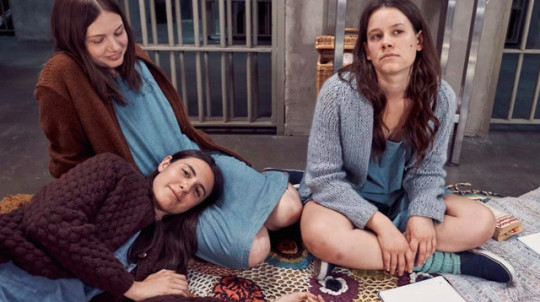
Family.
“We’re trying to say: stop thinking about Manson as the embodiment of all evil. If he got a record deal, maybe nobody would have died.”
Jack Moulton talks cults, Trump and noise-cancelling headphones with American actress and screenwriter Guinevere Turner. Charlie Says is her latest film with frequent collaborator, Canadian director Mary Harron.
Of the serial-killer films currently in release, Charlie Says is the one that puts a strong focus on the women who often remain in the background of these retellings. Leslie Van Houten (Hannah Murray), Patricia Krenwinkel (Sosie Bacon), and Susan Atkins (Marianne Rendón)—the three women who killed for Charles Manson (Matt Smith)—are imprisoned in isolation in a California penitentiary, as well as psychologically imprisoned by Manson’s delusional ideas.
Then graduate student Karlene Faith (Merritt Wever) is given the job of rehabilitating the young women—as long as they are prepared to confront the horrors of their actions.
Turner co-wrote the 90s urban indie lesbian feature Go Fish directed by Rose Troche, which preceded her meeting with Harron. Charlie Says is their most recent collaboration, having partnered previously on American Psycho and The Notorious Bettie Page.
What interested you in writing a film about Charles Manson? Guinevere Turner: When the producers met with me they said they wanted to focus on the women as we definitely never got a sense of a story told from their perspective before. Once I found Karlene Faith’s book The Long Prison Journey of Leslie Van Houten [Faith’s study of the rehabilitation process and elongated incarceration of the three Manson Family girls], I saw a whole side of the story that literally never gets represented.
I got very excited that I could make a good movie out of this and it would also be an interesting commentary on what it says about society that we always treated these women like they’re interchangeable. Nobody’s ever asked “what happened to them?”, “what made them do what they did?” and more importantly “why did we stop talking about them?”. We never stopped talking to Charlie! There was a real opportunity to talk about men and women, who and when we pay attention to historically.
Did you get the chance to work with Karlene Faith in person before she passed away [in May 2017]? Yes, she was fantastic. It took a while to persuade her into talking to me at first. I slowly gained her trust via email, then we would talk on the phone, and eventually I would be visiting her apartment in Vancouver and we became friends. For about two years we were as thick as thieves.
Her book was obviously a huge resource but she was also useful for research as she was a woman of that time. She gave me a great visual, listening to her activist life outside of prison. When she met the girls for the first time she had all these assumptions that they were gonna be freaky psycho-killers and she was blown away by how sweet they were. She was immediately turned by them and she wanted to help them.
What were some of the unexpected realities of living in a cult environment that you wanted to portray? So I grew up in a cult environment as you probably knew so I assume that’s why you ask that question. [Ms. Turner spent the first eleven years of her life as part of the Lyman Family. They were devotees of Mel Lyman who believed he and his commune members would eventually live on the planet Venus. Though parted from her mother after birth, she and her younger sister were ejected from the Family when her mother eventually decided to leave. Ms. Turner considered returning at eighteen but chose to go to college instead.]
Yes, I read the article in The New Yorker. For me, I was excited to bring this knowledge in my DNA of what it’s really like living in that environment to represent both the good and the bad parts. You have those semi-orgy scenes and people doing acid, but also scenes where everyone is sitting around for dinner. That grounds it a little more. At the end of the day, it is a family—albeit an infamously weird one—but it is a bunch of people trying to live together.
While there’s the “everyday” quality to it I also wanted to show the volatility. It can be beautifully tranquil one moment and then turn on the dime into something scary and destabilizing. I feel like those things were true of my childhood. Mary Harron heard me talking about my upbringing for decades and she would always say “you should write about it”. I didn’t want to write about it specifically, but when I found this movie I thought I could bring something personal to the project that no other screenwriter could.
We’re curious about how you like to write. What music do you listen to while you work and are there any films you used as inspiration? I can’t listen to anything when I’m writing. I have noise-cancelling headphones that don’t cancel noise enough. I could live in an actual sensory deprivation tank while I write and I would be so happy, but unfortunately you can’t bring computers underwater. So, no music.
I watched a lot of movies of the era, especially unconventional movies about Jesus such as Jesus Christ Superstar (1973). Those were interesting aesthetically.
There’s a shot in the movie where they’re walking up the side of this mountain and I just loved that iconography. We were short for time on the day and I pleaded with Mary to make it happen. It made me so happy that it became one of the images they use for the promotion of the film. It does feel like this biblical journey and we were trying to capture that vibe.

What do you do to ensure the female gaze is considered from the script? I find a lot of that is intuitive. For example in this script, there has to be nudity but you notice that every time someone is naked in this movie it’s really uncomfortable. That’s one thing in terms of subverting male gaze, is that there’s no way that any person could see those scenes as objectifying the body for more than a nanosecond because of what’s happening.
It’s all about power, so I like that it’s portrayed as being uneasy. Even when Matt Smith is naked, Charlie is exerting power over someone else and she’s repulsed by him. That’s one of my favorite scenes in the movie.
How does your acting background feed into the way you write your characters? I think because I’m an actor I deeply feel the reality of what’s available for the average female actor to play. There’s tons of “someone’s girlfriend” and all the tropes, so for me when I’m writing I’m asking myself what about this is going to make an actor say “yes please, let me play that part!”.
I need to present something complex and challenging that they don’t often see. As someone who’s auditioned for many characters that I thought were poorly written, I try and give even the small parts something that will make an actor excited to play them.
What makes your creative partnership with Mary Harron work so well? It’s funny because we’ve never really asked ourselves that. Of course in the last week we’ve been asked that a lot while we’re in the same room and we look at each other like confused animals going “why does it work?”.
We realize that we have a similar sense of humor so we laugh a lot even while we’re writing all this dark stuff. The main factor is that we really trust each other. One of the hardest things about collaborating is that you’re not sure if someone is shooting down your idea because it doesn’t work or they’re jealous that it’s good. You need to trust that you can test stupid ideas with them.
When we first met in 1996 [shortly after Harron’s directing debut I Shot Andy Warhol and Turner’s writing debut Go Fish] we immediately had an affinity for each other and started writing together. It was as easy the first time we tried it as it is now. There’s not even much of an evolution. I feel really lucky for that because as a screenwriter it certainly means I have a lot more access to the movie than usual because the director is always checking in with me.
Despite all of the bleakness, it’s clear in the film that these women just wanted to be loved. There’s such a deep sympathy for them. What interests you about the line of responsibility for those influenced by dangerous charismatic leaders? I’d say everything about that interests me.
I’m drawing parallels to politics today such as the alt-right people that Trump influences, for example. We’re seeing echoes where people are mindlessly following a person who is validating evil, dangerous, and disgusting ideas. For these women I had to constantly remind myself that they did commit these horrible crimes.
I feel like Charles Manson and Donald Trump are apples and oranges except for the fact that they strike me as people where their only real fuel is power and that half the time they don’t know what they’re doing or saying, they’re just terrified of losing it. They almost have no internal life. They just feel when they have the power and when the power may be taken away and what they do to keep it makes people do terrible things. It’s like an addiction.

Matt Smith as Charles Manson in ‘Charlie Says’.
I’m sure you’re painfully aware that we have four Charles Manson films coming out in a short space of time. There’s Tate, The Haunting of Sharon Tate, and Once Upon a Time in Hollywood, though I’m certain Charlie Says was conceived before all of these. How do you feel about being a part of this cycle? I started writing the movie in 2014 and most of the time movies are made two years later but that’s not how it worked out for various logistical reasons. So on the one hand, I cringe that it’s the 50th anniversary [of Sharon Tate’s murder] and that’s when our movie’s coming out—it feels tacky but it’s definitely not on purpose.
Which seems to be very deliberate on Tarantino’s part… But the way independent films work is that you try and get them made until you get them produced. You don’t have these luxuries of when exactly they’re going to come out. That said, we have landed in a zeitgeist moment which is nice in terms of people paying attention to the movie. I don’t know much about Once Upon a Time in Hollywood but I’m sure Tarantino has a radically different approach from ours.
While they share some similarities, your depiction of Charles Manson doesn’t work in quite the same way as American Psycho’s Patrick Bateman. How did you decide the ways you wanted to humanize Manson? I think the first thing that’s similar between how we portrayed these two characters is that while they’re these powerful frightening people, we’re demystifying them and grounding them in an essential pathetic loserness. Mary and I don’t talk about how we can make another movie that takes down toxic masculinity, that’s just where we end up sometimes.
With American Psycho the stakes of social responsibility were different. We were asking people to put your baggage with the book away, we’re women making this, and we are trying to turn it into something that’s a critique of masculinity in a funny and dark way.
For Charlie Says we’re trying to say: stop thinking about Manson as the embodiment of all evil. We want to stop giving him that power and show that he was a conman who was just a failed musician. If he got a record deal, maybe nobody would have died.

Christian Bale as Patrick Bateman in ‘American Psycho’ (2000).
I have to say, American Psycho holds up really well for the Trump era. One could argue that it works better now than when it came out.
How do you respond to the way you’ve already satirized these sociopaths in power and how that affected the increasing appreciation for the film over the years? It’s gratifying, because [American Psycho] was not particularly well loved when it came out. That’s disheartening when you work hard on a project that you think is more worthy. That said, it being more relevant now is terrifying. I watched the movie again recently and there’s a little part of you that cringes when we make Trump jokes because Donald Trump was a different kind of funny at the time.
‘Charlie Says’ is in US cinemas now, and available on VOD and digital from May 17.
#american psycho#charlie says#mary harron#guinevere turner#female filmmakers#female directors#directed by women#letterboxd
7 notes
·
View notes
Video
vhx
Aside from reviews that consistently drain critics’ supply of superlatives, you’d think it would be hard to find a common thread in Rebecca Hall’s acting career. It’s spanned 25 years (she got her start at 10) with stage, TV and film roles and comprised ingénues, diffident girlfriends, domestic terror victims, troubled career women and manipulative upper-class terrors. Small wonder the Los Angeles Times called her “capable of becoming anybody, anywhere.”
Actually, the thread is easy to spot. You won’t get far into any review of her work before you hit the word “intelligent,” time and again. Most of the women she plays are smart, and the way she plays them is pretty genius, too. Hall doesn’t burn up a screen as much as consume it with quiet intensity, enticing us with slow, subtle reveals of what’s going on inside her characters. The scenery chewing stuff “doesn’t interest me,” she told The Village Voice earlier this year. “One of my unhappiest states is to watch indulgent performances. I’m always looking for a counterintuitive way to do something that doesn’t feel like a repetition of an actor trope.”
Our theory is that she’s an intelligent actor because she’s an intelligent woman. She made her first smart acting choice at age ten. After somewhat reluctantly casting her in his television adaptation of Mary Wesley’s The Camomile Lawn, Hall’s father, legendary British stage director and Royal Shakespeare Company founder Sir Peter Hall, asked her if she wanted to be a child actor or an actor. She chose actor. She’d had her mom’s stash of Betty Davis movies on loop for years and knew exactly what kind of actor she wanted to be, and it wasn’t kids’ stuff. Hall considers her artistic parents (her mom is renowned opera singer Maria Ewing) and complex family life (her dad married four times) a gift; the way she sees it, a nonjudgmental acceptance of life’s ambiguities is one of acting’s primary requirements.
Hall studied English Literature at Cambridge, but dropped out shortly before her final year, ready to get on with what she’d known she was going to do anyway. She was reluctant to trade on her father’s work to secure some of her own but knew the whispers of nepotism would come regardless. So why not take the plunge, get the whispering over with, and prove her own merits, whatever they might be? At 23, she took the role of Rosalind in Sir Peter’s production of As You Like It at the Brooklyn Academy of Music. We’ll let the theatre press tell the rest. On top of calling her “a young actress of glistening freshness and uncanny intuition,” The New York Times wrote, “Not since Vanessa Redgrave’s Rosalind for the Royal Shakespeare Company in 1961 has a performance in the part provoked such feverish, star-making praise…When she finally takes her hat off, letting her hair tumble to her shoulders, she keeps her eyes closed for a second, like a diver before the plunge. She knows that whatever follows isn’t going to be easy. As Ms Hall presents the moment, Rosalind has never seemed braver.” The New Yorker said Hall “exquisitely conveyed the sometimes tremulous combination of knowingness and naïveté that characterizes Rosalind. If you knew and loved Rosalind’s lines, it was thrilling to hear the subtlety with which Hall delivered them.”
A casting director who witnessed the performance encouraged Woody Allen to cast her in Vicky Cristina Barcelona, and suddenly Hall was Hollywood’s new discovery. GQ’s review ran, “In the annals of acting, you won’t find a feat more impressive than the one Rebecca Hall pulled off: almost stealing a movie in which Penélope Cruz and Scarlett Johansson go lesbian. And she did it with fire-eyed soliloquies, not nude shots, and by making her character’s ambivalence about the meaning of betrayal the most heartbreaking conflict in the film.”
Roles in Frost/Nixon, Please Give and The Town followed to equal praise, and the Times doubled down in 2010: “Hall is among the fastest-rising, and most gifted, actresses of her generation.” Never mind she’d been “rising” ever since 2006 with her feature debut in Starter for 10 and The Prestige. Even a risky creep into horror (2011’s The Awakening) paid critical dividends, as did her first truly and deliciously unlikeable turn as Sylvia Tietjens in BBC Two’s Parade’s End(2011).
She topped them all in 2016’s Christine. “In lesser hands, the title role could have been hammy Oscar bait, wrote The Village Voice. ”Instead, Hall portrayed Christine Chubbuck, the Florida newscaster who shot herself to death on live television in 1974, with a low-key intensity that was simultaneously grim and heartbreaking.” And, we’d add, devastatingly human.
Hall has two films (Permission and The Dinner) out this year so far. Her third is Professor Marston and the Wonder Women, a true and fascinating origin story about the creator of Wonder Woman. It’s just now hitting theatres, but by all reports, she’s already stolen it. She’s also writing and painting when she can, and is adapting Nella Larsen’s novella Passing as a screenplay.
That Hall has managed to avoid getting bogged down in any one type of role, or one particular medium, or even in the Hollywood system itself is a tribute to her well-documented intellect. That said, “No matter how crafted or technical a situation is, I still get there through gut feeling.” No real artist operates without the certainty of instinct. She probably knew that all along.
#rebecca hall#video#interview#that's a whole biography right there#could replace the entire biography page for just this lol#off camera#2017
4 notes
·
View notes
Text
Signs as characters from ‘Black Panther’(2018) [Spoilers!]
Aries: Erik “Killmonger” Stevens / N’Jadaka
Born half a world away from his home, Erik was caught between the regal heritage of Wakandan Royalty, and the more tragic history of his ancestors from the US. He is angry, and has always been angry, with both his father and his heritage being taken away from him. He travels to Wakanda to burn it all down to the ground and start over, better, stronger, powerful and unafraid. Not for the nation that he thinks callously stood by and watched, but for him, and people like him. He consistently goes too far; he refuses to listen to others, disrespects tradition, and all life around him. The burden he carries is his and his alone, and he wants to keep it that way, accepting no help or advice. An angry, righteous, wronged child, who became an angry, righteous man, one who went about life in all the wrong ways. Not only does he claim to be helping people, but in the process, he becomes the people he fights against. He sees the error of his ways only when he has no choice, faced with the severity of what he wanted to do.
We love villainizing black revolutionaries and portraying them as New Imperialists of Color™ even though we know that’s not what anyone thinks and is only a trope based on white fears of black liberation
Taurus: King M’Baku
The leader of the Jabari, a tribe isolated in the mountains, deeply respecting the land and the ecosystem of where they come from. They don’t even use the same technology; even though they are just as advanced as other Wakandans they don’t rely on Vibranium. They rely only on themselves and their lands, using Vibranium-infused woods to build and innovate. This reflects also in their cultural divide from the rest of Wakanda, preferring to watch on as they worship the Gorilla-god Hanuman, instead of the Panther goddess Bast. They are direct, and slow of action, but once it is undertaken they cannot be stopped. All that being said; they are not cold or unfeeling. There is warmth, and humor, and comfort to be found here too. M’Baku is a proud leader, a respectful one, and who gives people the respect he thinks they are due. Ultimately, it is this respect which compels him to come to the aid of King T’Challa. He has not forgotten his grievances, but he does not let them blind him to what must be done, for his people. He has the intuitive knowledge that though the Jabari and the other tribes of Wakanda are distinct, they are equal parts of a unified whole, a family deserving of security and comfort.
Gemini: Princess Shuri
The bubbly, mischievous Princess of Wakanda, with a brilliant mind that leaves others behind her. She supplies the Kingdom with the newest technological advancements possible, and is the spark that keeps everyone going when things seem too dark. She is, canonically, the smartest person on the planet; Her intelligence knows no bounds. She prevents those around her from being too stuck in their ways, simultaneously progressive while valuing the traditions of her country. As the youngest character in the film, she keeps everyone else on their toes with quick witted jokes. She later proves herself a formidable opponent in combat too, though. Her emotions are also kept under the surface quite well; you forget she is a young girl grieving her father until she grieves the possible loss of her older brother, and it’s a memorable moment for being one of the only times she doesn’t have something funny to say, or a smile on her face.
Cancer: Queen Ramonda
A regal presence, and one of the most important people in the film. She is a new feminine archetype, a queen mother composed. The way her son never hesitates to come to her for advice speaks to the way she has been there for him, as a mother should be for her child. She makes sure her royal children toe the line, encouraging them to change and adapt while keeping them realistically grounded in tradition and respect. The love she has for her husband, her son, her daughter, and her country is part of what drives the film forward. Her guidance is what has allowed King T’Chaka and King T’Challa to become the men they were and are, and what has allowed Shuri to shine the way she does, even if it’s not obvious. Her grief and her love are one of the most powerful forces in the film.
Leo: King T’Chaka
Though we saw more of him alive in Captain America: Civil War than we do in this film (as it starts shortly after his death), King T’Chaka’s legacy touches every aspect of the story. The decisions he makes earlier in his reign and he legacy of the country he ruled are his son’s to inherit. T’Challa feels eclipsed by him, haunted by him, and misses him all at once. Even in death, T’Chaka urges his son to not stray too far from the path he himself walked as king while urging him to fix his mistakes. It was his duty to punish those who betray the country of Wakanda, and though he pays a price, it is eventually his son who must pay a bigger one. The gravity he exerts is immense. He is an avatar for the past, the noble history of Wakanda and the entire Panther tribe who has come before T’Challa and before the current generation.
Virgo: Nakia
A Wakandan Spy, or ‘War Dog’, keeping intelligence on the goings-on of other countries, their governments, and their populations in the name of Wakanda’s. We first see her comforting and consoling a desperate group of kidnapped women, before her mission is interrupted and she is forced to finish it ahead of time. A paragon of efficiency, competency, and beauty, she is deeply analytical and yet compassionate; especially with regards to the outside world and Wakanda’s complicated relationship with it. She does not let romance or personal motivations cloud her judgement; she thinks only of making the world around her a better place for all people. She is deeply loyal and objective. Her vision of Wakanda never faltered and neither did her loyalty -- Erik Killmonger became King, and when she deemed him unfit to rule, she adapted quickly and forced Okoye to choose definitively. She is the subtle (and unsubtle) agent of change throughout the movie.
Libra: King T’Challa
T’Challa comes to the throne in politically challenged times; the Jabari grow restless, and directly challenge him for the throne; his father has died; the secrets of Wakanda must be hidden even as their proud legacy is upheld, and within all these contradictions, there is another secret; Erik Killmonger reveals himself to be N’Jadaka, son of N’Jobu, who was brother to T’Chaka. Even as T’Challa walks in the footsteps of his father, he refuses to commit the same mistakes. Though he asks for counsel from a few trusted others, he also trusts himself enough to do what is right by his country first and foremost. Throughout the film, he challenges his own perceptions and comes to conclusions based not only on emotion, not only on logic, not only on tradition, and not only on the motives and opinions of others, but on an acknowledgement of all these things.
Also, he still freezes when he sees his crush. It’s really cute LOL
Scorpio: W’Kabi
W’Kabi is... interesting to me. His role in the film is somewhat understated, but he is a prominent figure in the Border Tribe and a friend to T’Challa. He and his people serve as a powerful shell for the nation of Wakanda, not through force or violence but through illusion and the maintenance of it. His people are the first line of defense, the ones who greet the world playing the parts of the deprived shepherds, the impoverished populations. They know what the international community thinks of Wakanda (and of the images that persist in association to the continent of Africa and it’s people) and they maintain that facade deliberately, as they have for centuries. It’s not all lies with him either though... because he values that which is real. He asked T’Challa to return to him with the one who killed his parents, Ulysses Klaue, and where T’Challa failed him, Erik Killmonger didn’t. Fueled by a vengeance he didn’t even get to witness, against an enemy he never saw; Erik Killmonger and W’Kabi saw themselves in each other, and he put his trust in a man who fulfilled a promise his lifelong friend couldn’t. He tests his relationships, too, most overtly when he asked his wife General Okoye if she would kill him, and she said yes. He tests the boundaries of T’Challa’s forgiveness too, after everything is said and done.
Sagittarius: Ulysses Klaue
He lives a carefree life; he takes risks, and if they don’t pay off, they don’t, but if they do, he wins! He’s clearly a gambler. He knows the legacy he inherits as a white man plundering a wealthy African kingdom, and not only does he know it, he enjoys it. He revels in it. He gambles with his life trying to go back to Wakanda to steal from it, all because he wants to. He wanted to see its wealth for himself and chose to do so by any means he could. He considers himself an expert of sorts, happily preaching to CIA Agent Everett Ross about the wealth of Wakanda and the lie they tell the rest of the world. He travels the world in this manner, always seeking something more, experiences to have and objects to accumulate.
Capricorn: General Okoye
From the first moment we see her to the last glimpse of her on screen, she exudes nothing but confidence, loyalty, and competency. And yet... she’s complex and vulnerable in a way that doesn’t negate any of those qualities. She chides T’Challa as much as she defers to him, counsels him as much as she is counseled in turn. They aren’t just employee and employer, protector and protected, they are friends and protectors of each other. Her loyalty to her country is resolute, and as shaken as she is that Erik Killmonger sat on the throne she took it upon herself to protect him as the ruler of Wakanda, as was her duty. It’s important to realize that her not stopping Nakia, her inaction, was in itself an action. Her directing the Dora Milaje to fight against King Killmonger turned the tide, and at great personal cost to herself. She lost a friend in the battle, one under her charge, and she would’ve been trampled by her own rhino had it not recognized her! Her own husband tried to test her commitment to him and was faced with the reality that her loyalty is first and foremost to her people, her country, to tradition.
Aquarius: Prince N’Jobu
Prince N’Jobu wanted to help the world and paid a price for it. His pain was real; the suffering he saw was real, the suffering of his son who grew up without him was real. The help he wanted to offer to the diaspora was real. He felt it so deeply necessary he willingly allied himself with Ulysses Klaue and caused the deaths of several Wakandan citizens in order to arm people around the world. His son only followed in his father’s footsteps, more angry and personally than N’Jobu ever could’ve been. At the end of the day, that’s the difference; detachment and desire. N’Jobu was too compassionate and too extreme, his son too angry and too shortsighted.
also the opening is literally him telling his son about the Kingdom of Wakanda, explaining just how it came to be with a reverence and a detail that spoke of how much he wanted to change it for the better. and even though he never went back. Which fucking sucks
Pisces: Zuri
Zuri’s role is that of the Priest, the Shaman, the Human Voice through which the Gods speak. He bestows spiritual authority onto T’Challa and formally passes the crown on. He guides T’Challa to the ancestral plane to speak to T’Chaka once more. This is symbolic; the sign of Pisces has always been a transition, the last experience before we cross a boundary, whether that is to the afterlife, to a new one, or to the Whole. The weight he holds as a spiritual guide to the King and to the people of Wakanda is visible as soon as he is on screen, and it is because of him that many of the events of the film even happen. His presence is very “behind the scenes” at times, which I think fits the mold of this sign really well. He was shot at by N’Jobu, which caused T’Chaka to kill him, something that’s interesting. Without him, I don’t know how the film would’ve (or even could’ve) unfolded.
980 notes
·
View notes